
Letter from the President:






Rowan-Cabarrus Community College has spent more than 50 years serving Rowan and Cabarrus counties, ultimately educating nearly 650,000 individuals. Over time, the College has progressively evolved in response to our community’s workforce and economic development needs, annually serving more than 20,000 individuals on our seven campuses and sites across our two counties. The success stories of our local students and graduates demonstrate amazing commitment, sacrifice and dedication. At this time in our history, the work of Rowan-Cabarrus has never been more critical and the challenge our community faces has never been more pressing, complex or shared.
I firmly believe that education is the best investment anyone can make. It improves the lives of individuals, their families and the community. Ultimately, a more educated region will result in a stronger, more vibrant region. Now – more than ever – Rowan-Cabarrus needs your support to build a better tomorrow. Together we can strengthen our region by providing extraordinary opportunities for students and preparing graduates to live meaningful lives as active and contributing members of our community.
We believe Rowan-Cabarrus has a promise to fulfill—a promise exemplified by a regional mission and a vision for the future vitality of our community in Rowan and Cabarrus counties. We think we’re a part of the solution... and so are you. As we grow, adapt and anticipate the needs of students and the community, public and private investment is crucial. We must improve and update programs, laboratories and equipment; develop new programs aligned with emerging labor market demands; and increase student scholarships.
We appreciate your support in this worthy effort to improve our quality of life and to strengthen the future of our community.
Sincerely,
Carol S. Spalding, Ed. D. President
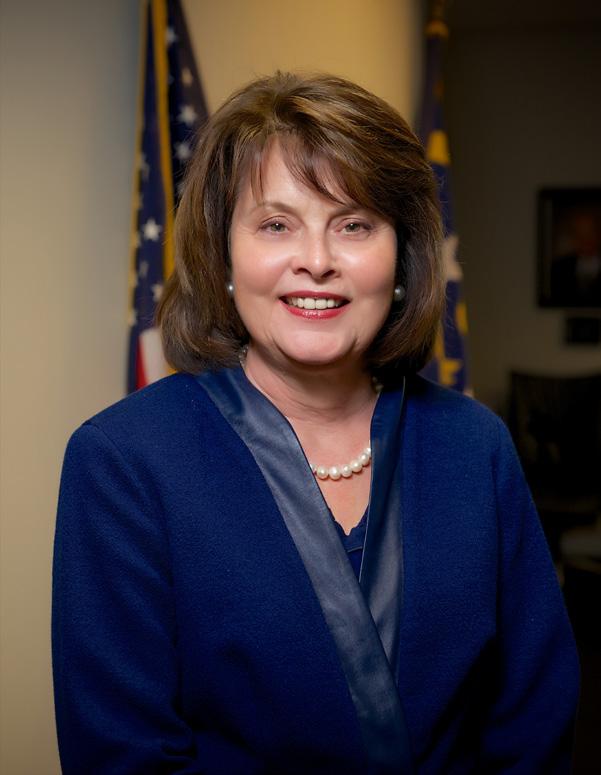

The College has been a vital contributor to the economic health of both Rowan and Cabarrus counties for many years and has long been recognized for its important role in the education and retraining of our citizens. Our nation’s economy is changing, as is our job market. New businesses coming to our area and steadily improving unemployment rates are heartening. However, the work is not done. Moving forward, I believe that RowanCabarrus Community College will have an even more significant role in shaping the future of our community.
Whether you are seeking a two-year degree or planning to transfer to a four-year college or university, hoping to rejoin the workforce, or simply looking to improve your skills for new challenges or new careers, Rowan-Cabarrus will help you “Navigate Forward.” I believe that I speak for the entire Board of Trustees when I say that I am proud to have Rowan-Cabarrus leading our community as we navigate our collective future.

• The College has served nearly 650,000 students since its founding in 1963.
• Rowan-Cabarrus is the ninth largest in enrollment among the 58 North Carolina community colleges.
• In 2012-2013, the total contribution of Rowan-Cabarrus alumni currently employed in the state workforce amounted to $234 million in added income.
• Sixty-two percent of our students are female, 38 percent are male, 65 percent are under 30 and 38 percent are minorities.
• Forty-six percent of our students work full- or part-time.
• Approximately 60 percent of RowanCabarrus students are enrolled in Corporate
and Continuing Education classes.
17:1 FACULTY TO STUDENT RATIO
OFFERS
36 DEGREES* 30 DIPLOMAS 141 CERTIFICATES
NUMEROUS COMPLETELY ONLINE DEGREES

20,000OVER STUDENTS ANNUALLY
• Rowan-Cabarrus employs nearly 400 full-time faculty and staff members, as well as 600 part-time faculty and staff.
* The new statewide Comprehensive Articulation Agreement with the state universities has resulted in pre-major degrees being condensed. Additionally, the College has streamlined its degree offerings in order to better serve our students.
Tre’ Williams, the College’s first Morehead-Cain Scholar and graduate of one of the College’s early college high schools, spoke at the May 2014 graduation ceremony. Tre’ is currently working to complete his bachelor’s and graduate studies – at not cost – at the University of North Carolina at Chapel Hill.

ver 960 graduates received associate degrees, diplomas and certificates at Rowan-Cabarrus Community College’s 50th graduation ceremony on Friday, May 16, 2014.
Among them was Daverian “Tre’” Williams, the College’s first Morehead-Cain Scholar, graduate of Cabarrus-Kannapolis Early College High School and Rowan-Cabarrus. Tre’ will go on to receive his bachelor’s and graduate coursework from the University of North Carolina at Chapel Hill – at no cost – thanks to his scholarship and his tuition-free associate degrees from Rowan-Cabarrus.
“It feels great to graduate from Rowan-Cabarrus,” Tre’ said. “I’ve worked hard, but I’m also very fortunate to be where I am in life.”
Only three percent of each year’s nominees are selected as Morehead-Cain Scholars. Williams, along with North Carolina Governor, the Honorable Patrick L. McCrory, spoke to nearly 5,000 people at the College’s 50th graduation ceremony.

“When I filled out the application for the MoreheadCain scholars program, I did not think I would receive it.… To accomplish great things, we must not only act but dream.… Dreams aren’t just for little children. They’re a driving force of

humanity,” Tre’ said. “I made that dream into a goal, and I made that goal into a commitment. A dream without a plan will always stay a dream.… I challenge each of you to grab those dreams because, once you do, the future is yours.”
The 960 graduates earning their degrees at the College’s 50th graduation ranged in age from 17 to 68 (average age is 31), with 66 percent female and 34 percent male. Forty-two percent of the graduates lived in Rowan County, with 45 percent from Cabarrus County and 13 percent from surrounding counties. These graduates received over 1,700 degrees, diplomas and certificates.
“We are so proud of Tre’. What he’s accomplished at such a young age is quite admirable,” said Dr. Carol S. Spalding, president of Rowan-Cabarrus. “We have many tuition-free offerings at RowanCabarrus for high school students, and I hope Tre’s success will inspire others to take advantage of the innovative courses and programs that are available through Rowan-Cabarrus.”
An additional 632 students graduated from the College’s GED (high school equivalency) program, representing the largest number of GED graduates in the College’s History.


Ashley Honeycutt graduated from Rowan-Cabarrus in 2008 as a registered nurse. Today, after graduating from Duke University with her master’s, she is a pediatric nurse practitioner living with her husband in the same community she grew up in.

When Ashley Honeycutt graduated from RowanCabarrus Community College a few short years ago, she didn’t know she’d already have her dream job.
But she does. Today, Ashley is a pediatric nurse practitioner at Salisbury Pediatric Associates. Ashley graduated from Rowan-Cabarrus in 2008 as a registered nurse. Now, after graduating from Duke University with her master’s, she and her husband live in the same community she grew up in.
“I had a great experience at Rowan-Cabarrus. It’s a difficult program, but thanks to some amazing instructors, you can learn a lot and make it through,” said Ashley.
Rowan-Cabarrus nursing programs have a welldocumented track record of success in both student performance and program recognition. Because of this track record, the College was awarded a prestigious new grant to revise the Practical Nursing and Nursing Assistant curricula.
“We are honored to have been chosen to facilitate this nursing curriculum improvement project,” said President Spalding. “When change is coming, you can either accept the path that others lay out for you, or you can take the lead in developing what that path will be. I am pleased that our faculty have led this initiative that will influence nursing education and the healthcare workforce statewide.”
This project was extremely important, as these curriculum core courses have not been revised at the state level since 1997. Healthcare trends have dramatically changed during this time.
Today’s aging population, individuals with disabilities and those with serious illnesses, are outpacing the number of skilled workers with the necessary knowledge. Advances in medical technology as well as the procedures used to care for these individuals are requiring additional training and more education to keep pace with all the change.
“Many procedures that once could be done only in hospitals are now being performed outside of hospitals, creating demand in other settings, such as outpatient care centers,” said Cathy Norris, RN, MSN, director of the College’s nursing programs.
Research demonstrates a growing shortage of nurse aides, both nationally and statewide. In response, Rowan-Cabarrus offers multiple nursing program options, including the associate degree in nursing (ADN) and licensed practical nursing (PN) degree.

The College’s nursing students pass their national exams well above the national average each year. In 2014, in fact, 100 percent of the licensed practical nursing graduates passed their exams.
“We are very proud that 90 percent of RowanCabarrus nursing graduates are employed by Novant Health Rowan, the W.G. (Bill) Hefner VA Medical Center, Carolina’s Medical Center-Northeast, long-term care facilities, hospice and other medical providers throughout the state” said Wendy Barnhardt, dean in Health and Education Programs.


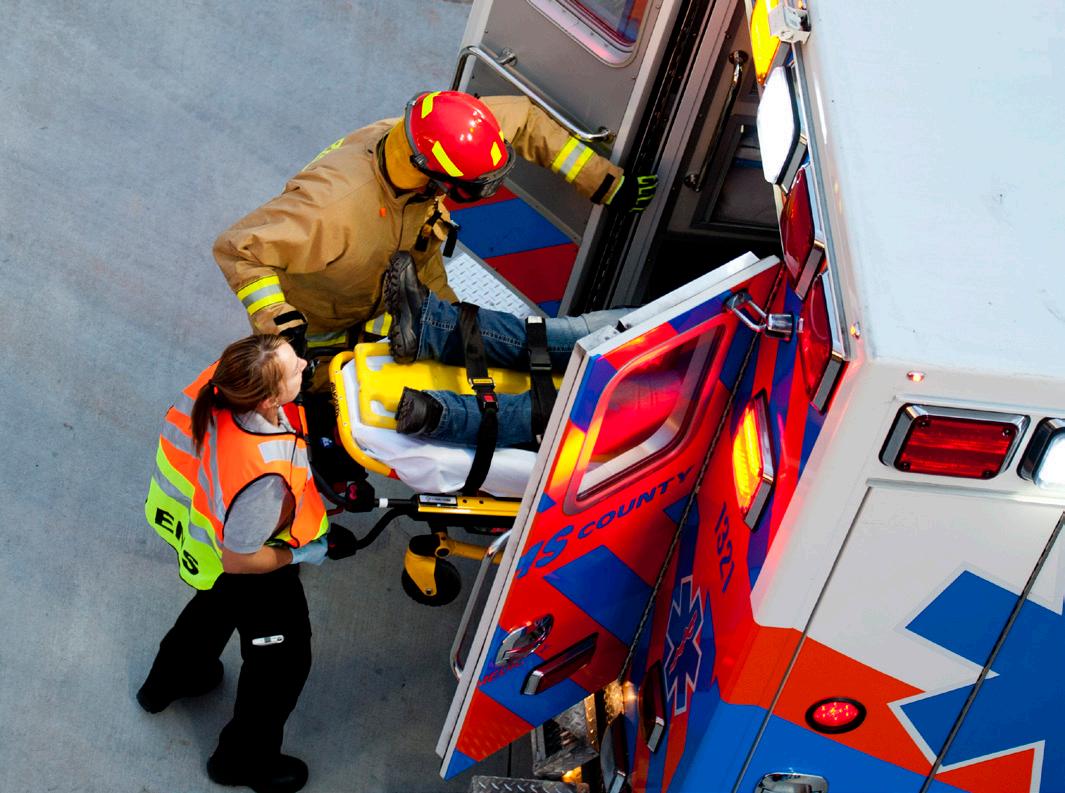
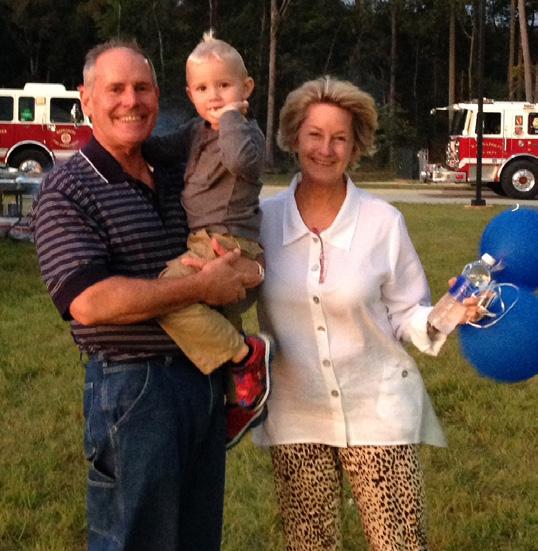

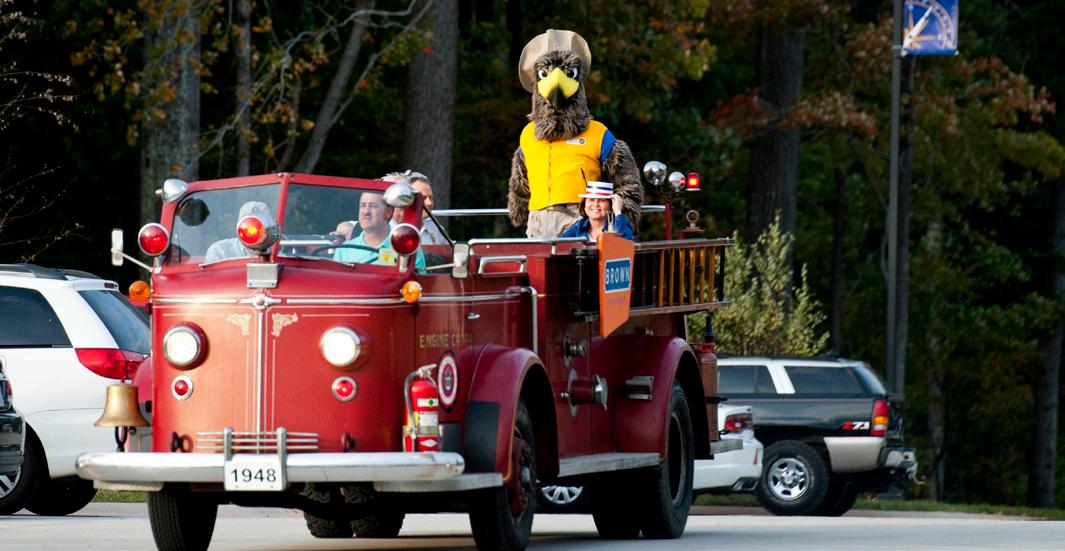
Fires are burning at Rowan-Cabarrus Community College – but it’s nothing to worry about. It’s just the College’s new Fire & Emergency Training Facility in action.
The Facility was the first project to be completed in a series of Rowan County bond funded construction projects.
To celebrate this important milestone, students, staff members, first responders and members of the community gathered for FireFest, which featured a demonstration by Concord Police Department’s K-9 unit, car rescue, turn-out gear challenge, high line rescue, bucket brigade, car fire and firefighter challenge.
“We wanted people in the community to be able to experience the purpose of the training grounds and have some fun,” said President Spalding.
The new training facility includes a 3,500-square-foot burn building, training pads for props, driver training services, flashover chamber, two rail props, fire extinguisher station, retention pond, mobile classroom and office and extrication props.
“It was wonderful to see so many families on the College’s campus,” said William Cannon, president of The Cannon Foundation. He and his wife, Ann, and grandson, Eli, enjoyed hotdogs and ice cream cones at FireFest. “My family and I had a great time learning about the various public safety professions - especially my grandson!”
With the completion of the first phase, additional funding is needed for the next phase which will include a mock fire station, expanded props with search and rescue trenches and much more.
“This is totally new training,” said Tracy Winecoff, a division chief with the Kannapolis Fire Department.

In 2014 alone, over 200,000 hours of training were provided and nearly 7,500 certifications were awarded for approximately 17,000 fire and emergency medical services (EMS) personnel.
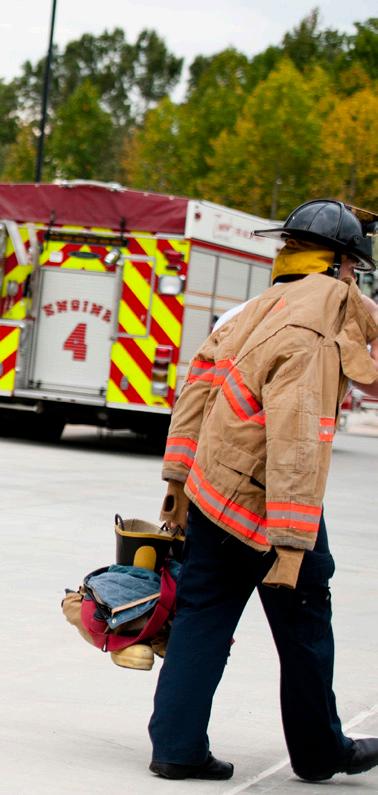
“It previously took years to get certification,” said Roger McDaniel, director of emergency services. “We’re now getting these guys certified in less than eight months. We can train our firefighters to a much higher level.”
The College has received several training prop donations for the facility including a box car from Norfolk Southern, an oil tanker from GATX, a sleeper truck and a stainless steel tankard from Bost Trucking, and a fire engine from the City of Salisbury.
“Industry-recognized, high-tech equipment is critical to the success of our programs and our graduates,” said President Spalding. “If students can’t leave here knowing how to use the equipment that an employer uses, they won’t be as successful as the jobs require.”
The College has provided over 260,000 hours of in-service training for public safety personnel, resulting in nearly 13,000 professional public safety certificates. Rowan-Cabarrus welcomes inkind donations, which help the College keep pace with changing technology and equipment needs and meet the demands of increased enrollment.
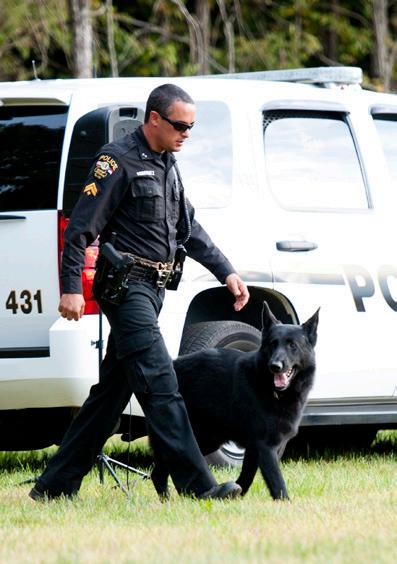
Fine and applied arts are a vibrant and growing part of the College’s offerings.
“The arts are very important to the College and our community,” said President Spalding.

As part of this celebration of the arts, Rowan-Cabarrus held several events, including art exhibits and a music, drama, literature and fine arts festival called Step into Culture.


“Step into Culture was a diverse, cultural experience with music, live demonstrations, poetry, spoken word, a student art gallery, food trucks and vendor tables, a sense of community, and more,” said Jenny Billings Beaver, chair of English, Developmental Reading and English and ACA (academic-related) courses at Rowan-Cabarrus.
“Our exhibitions are a great opportunity for students to share their creative work with the community,” said Jenn Selby, program chair of the Department of Fine & Applied Arts. “They love talking about their work and it benefits them professionally.”
The events over the course of the year included student drama demonstrations, performances by the College’s new chorus, which as of fall 2014 offered four levels, and art displays by both student and faculty artists at Waterworks Visual Arts Center. A poetry slam and “open mic” performances also gave students an opportunity for impromptu engagement.
The College also began offering a new in-depth, two-year professional preparation program that leads to an Associate in Applied Science degree in Advertising and Graphic Design, as well as new music and drama specializations within the AFA program. The Rowan-Cabarrus AFA program is designed for students who plan to transfer to a four-year fine arts program. The AFA program is also suitable for students who want to focus on their personal creative development, expand their portfolios or work in related creative industries.
With appropriate education and training, an AFA degree can lead to a number of career options, including career artist, graphic designer, commercial photographer, photojournalist, art director, theater set designer, museum curator and business owner.
“Due to the rapid growth of graphic design, there are tremendous opportunities in corporate design departments, advertising agencies, design firms, newspapers, and magazines. These industries are looking for talented, skilled designers who can develop advertising ideas and produce graphic solutions that will sell a client’s products or services,” said Jenn.
When the Associate in Fine Arts degree started in 2009, the primary focus was on the visual arts, but the College is working toward expanding the degree program to better include the performing arts and now the applied arts.
“We are proud that our fine and applied arts offerings have grown so much, and Rowan-Cabarrus can be an important part of the robust creative community in our area,” said President Spalding.
BUILDING SUSTAINABLE FUTURES THROUGH THE POWER OF LEARNING.



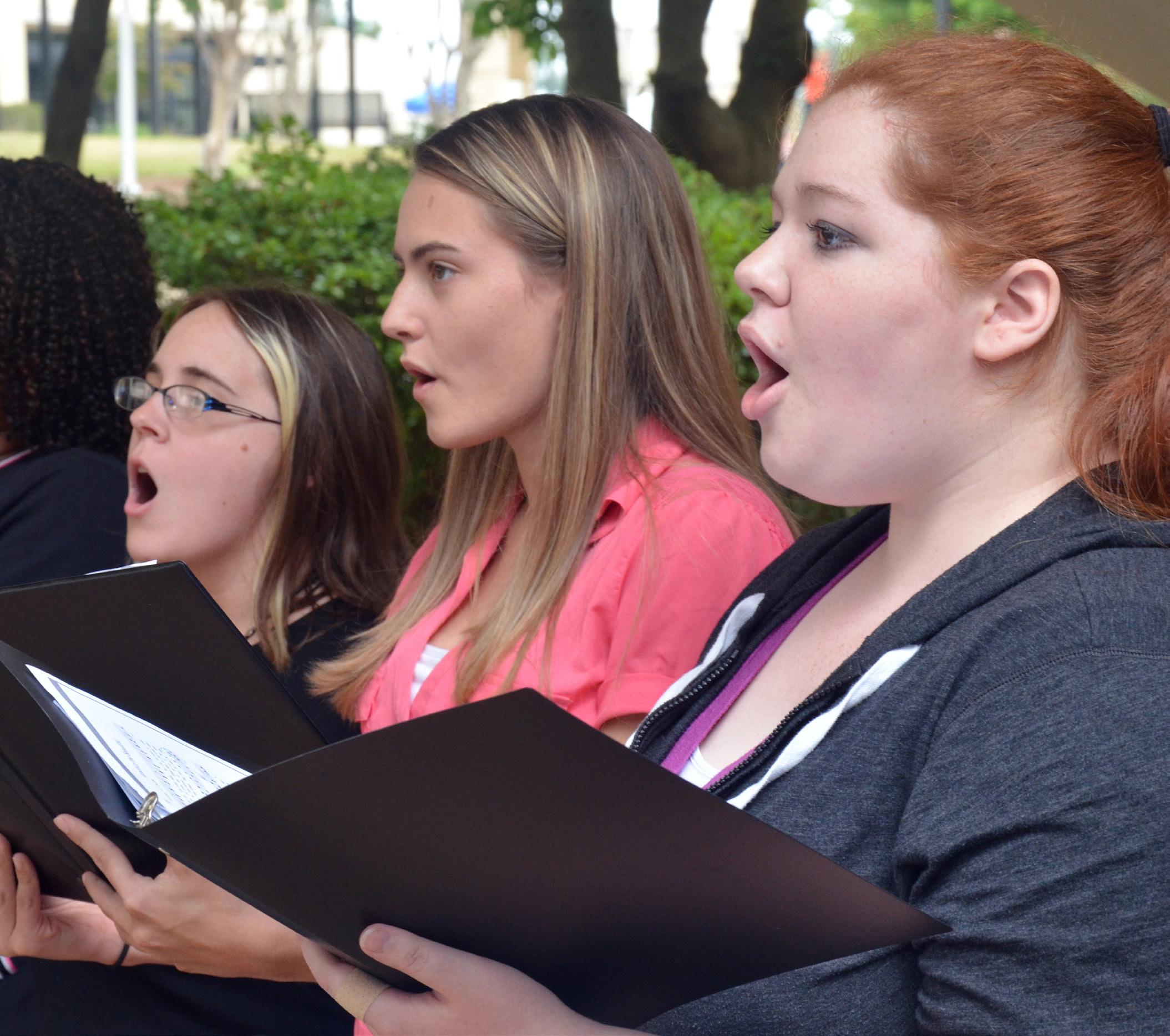
abarrus County residents overwhelmingly supported the 2014 Rowan-Cabarrus bond referendum for an Advanced Technology Center with over 64 percent of the vote in November.
“We’re excited about the voter confidence from the community to make that happen,” said President Spalding. “I want to thank Cabarrus County voters for their support. The $9 million bond referendum will fund the majority of a new Advanced Technology Center for the College.”
Applications of advanced technology – from automated manufacturing, logistics, warehousing and 3D printing, to cyber security and information assurance – are evolving as growth areas for existing businesses, facilitating a regional culture of entrepreneurship and bringing new technologycentric companies to the area.

“We believe that this is the next step forward for our region – advanced technology and advanced manufacturing. An Advanced Technology Center will be a flagship to help attract employers to the region,” said President Spalding. “This will help us meet the needs of the community and bring a higher level of training to Cabarrus County, which is a big part of economic development.
“With the announcements of Alevo and Gordon Food Service coming to Cabarrus County, we’re
going to have more and more employment, and we need to have the capacity to educate the people who live in the region,” said Dakeita Vanderburg-Johnson, president of Vanderburg Enterprises LLLP and co-chair of the “Say Yes + RCCC = Better Jobs” Bond Referendum Committee.
An Advanced Technology Center, a 60,000 square foot classroom and lab building, will address training needs for companies with high technology demand and emerging jobs through industry-recognized certifications and hands-on skills training in multiple disciplines including, but not limited to: Information Technologies (IT), welding, machining, HVAC, electronics and electrical engineering technologies, mechanical engineering, hydraulics, pneumatics, nanotechnology, advanced manufacturing and more.
“We want to thank all who publicly supported the bond campaign. Students, faculty, staff, donors, board members and alumni all contributed by writing letters, going door to door, working the polls and putting out yard signs,” said Pat Horton, president of Uwharrie Bank and co-chair of the Bond Referendum Committee. “We can’t thank you enough for showing the College your support.”
Computer Integrated Machining Technology student Brandon Nelson is pursuing an Associate in Applied Science degree, graduating in May 2015. He is already working in his field at Advanced Machining in Salisbury.

Cosmetology graduate Lori DiDonato owns a successful salon in Cornelius. She believes the College prepares students for the industry and always looks at resumes from RowanCabarrus graduates first.

hen Lori DiDonato moved to the area in 1999, she was tired of corporate America. She was looking for something new – something exciting and challenging. She chose the Cosmetology program at Rowan-Cabarrus Community College.
Today, Lori owns Untangled Salon, a successful business in Cornelius. As a single mom and new entrepreneur, she committed herself and her family – and her retirement – to the business.
The Rowan-Cabarrus cosmetology program is one of the largest and most successful in the state. The program prepares students to be successful. Over 95 percent of cosmetology, esthetics and nail technician graduates pass their licensing exams annually with flying colors. Beginning summer 2015, beauty finds a new home as the College relocates the Cosmetology program to downtown Kannapolis.
This exciting relocation wouldn’t have been possible without local support from Cabarrus County and the City of Kannapolis. The College received $1.5 million from Cabarrus County to relocate the program, as well as an additional $150,000 economic development grant from the City of Kannapolis.

“We believe this is the first time a city has contributed to a community college capital project,” said President Spalding. “We are very grateful for support from the City of Kannapolis. Unlike the county, they’re not required to support us. This may be a first-of-its-kind economic development collaboration.”
While Lori didn’t get to take advantage of the new location for her degree, she’s been more than pleased with the training she received.
“I think the College is fantastic and has one of the best programs for cosmetology. They have the right people in the right places to prepare you for the industry,” said Lori. “I definitely hire RowanCabarrus graduates. If I see a resume from a Rowan-Cabarrus graduate, I look at it first.”
Rowan-Cabarrus offers day and evening classes to accommodate those with different schedules. The College will welcome clients to this new location beginning summer 2015.
“We teach everything there is to teach about beauty,” said Wanda Pressley-Altman, chair of the program, including instruction on all things hair, skin and nails. “We are moving to a beautiful new location, but we are still offering cutting-edge classes right now.”
Many classes are also well-suited for the hair stylist who wants to stay current on the most up-to-date styles, cuts and colors.
“I’ve never stopped learning. Professional development is critical for both myself and my stylists,” said Lori. “If you aren’t learning, you’re going to fall behind.”
The College specializes in training for contemporary design, individual hair extensions, keratin smoothing treatments, blow-outs and other cutting-edge cosmetology practices.
“Our cosmetology program is not only widely successful, but it’s a wonderful example of our strong partnership with local high schools,” said President Spalding. “The Career & College Promise program allows students to simultaneously enroll in high school and college, so that they can receive both high school and college credit for courses taken as part of the program.”
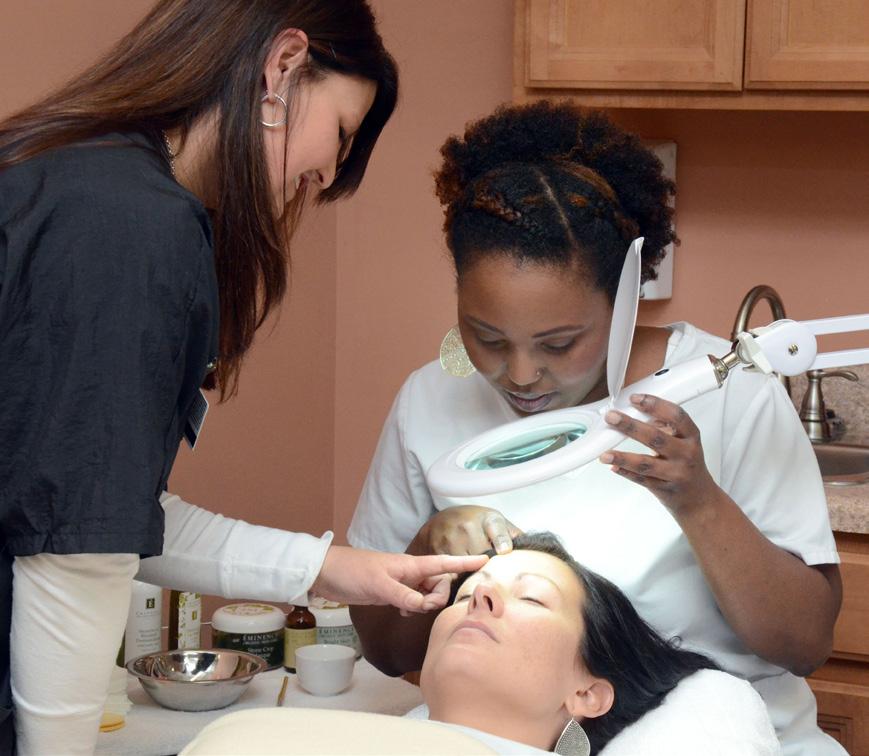
ollege is about more than just classes and papers and exams. Or at least that’s what you’d learn if you explored the many extracurricular programs at RowanCabarrus.

“We believe that our ever-expanding set of extracurricular activities and communications creates a holistic student experience, developing wellrounded graduates,” said President Spalding. “It’s all about developing leaders and helping them engage in their community.”
And these activities have been recognized outside of Rowan-Cabarrus walls. Among its peers across the state, the College has been awarded multiple Top Campus awards for key student projects such as passing the $12 million 2010 Rowan County bond referendum and developing an innovative field trip program called $5 Fridays.
“The new tradition of $5 Fridays allows students to take unique day trips that help expand their exposure to culture,” said Natasha Lipscomb, director of student life and leadership development.
A pre-holiday season trip to the Biltmore Estate in Asheville was booked at lightning speed. This new activity helped the College earn the Top Campus, or Top “C” Award, yet again at the state level.
Also new this year at Rowan-Cabarrus was the reveal of the College’s first mascot. As part of the College’s rebranding process over the last few years, students, faculty and staff expressed an interest in having a real, live mascot.
“We want to build traditions here at RowanCabarrus,” said President Spalding. “We know our students are busy, but we still want them to feel connected to the College. Having a mascot and vibrant student activities can help build this connection. We want our students to stay in touch with us after graduation and remember their time here fondly.”
Students, faculty and staff turned the new tagline, “Navigate Forward,” into a call to become the Rowan-Cabarrus Navigators. From there, groups
decided what the Navigator mascot should be, and ultimately, once created, watched him “hatch.”
“Beacon is the name we voted on for our new Navigator mascot,” said Anthony Rossi, 2014-2015 president of the Student Government Association. “Beacon is a red-tailed hawk, because, like many of our students, he’s native to this region. He’s got his hiking boots on the ground because he was made for chartering heavy terrain. He’s got his compass ready and he’s navigating his way forward.”
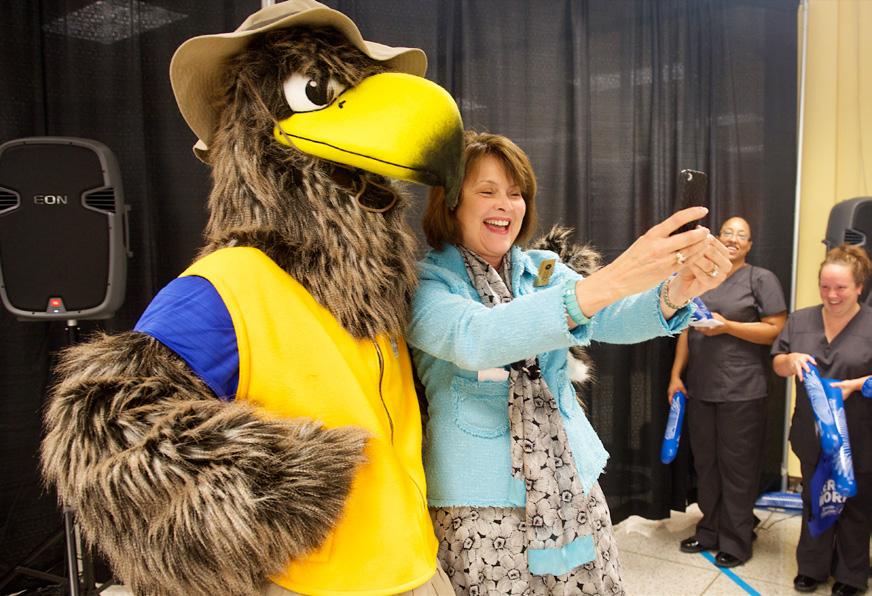
Students, like Anthony, who are engaged in clubs and leadership roles, as shown above, have the opportunity to travel across the country to compete in competitions and learn. Several student leaders have found themselves in locations such as New Orleans, Kansas City and Anaheim, California. Many also found themselves returning with national awards and recognition.
The College is committed to developing student leaders on campus. When Rowan-Cabarrus first started the Sigma Alpha Pi program on campus, the College was the first community college in the state to host the organization. Today, more than 20 additional community colleges in North Carolina have followed suit.

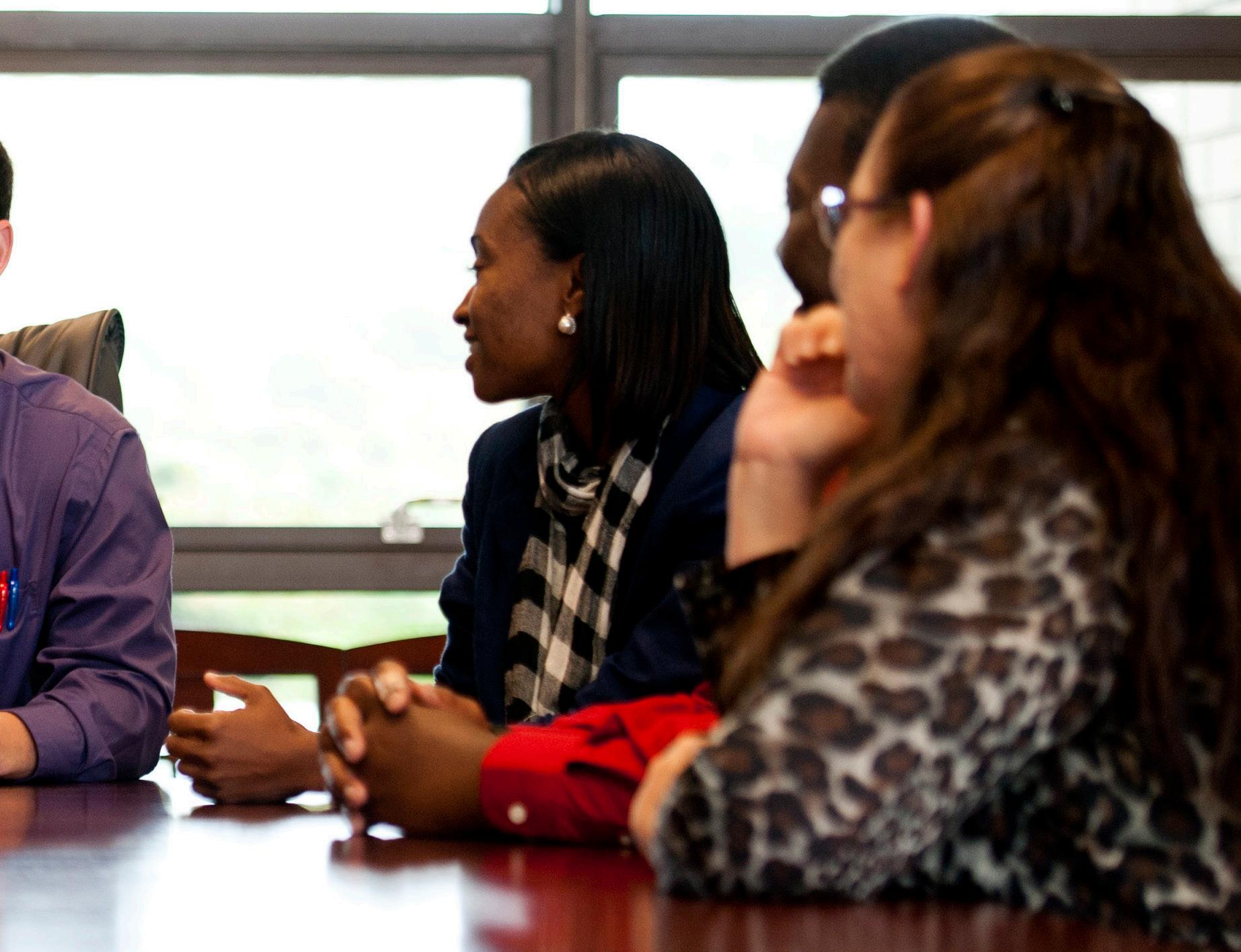
Virtual reality welding has expanded the traditional welding curriculum at Rowan-Cabarrus to enhance the quality, quantity and efficiency of training – bringing the training out into the community and ultimately increasing the number of welders entering the field.

Welding went virtual at Rowan-Cabarrus this year. Thanks to a $247,453 investment from the Duke Energy Foundation, the College was able to integrate virtual reality welding into the traditional welding curriculum to enhance the quality, quantity and efficiency of training – ultimately increasing the number of welders entering the field.
Virtual reality welding equipment eliminates the cost of the metal used in traditional welding classes. Additionally, the device scores each weld and gives immediate feedback to the student welder. Other students can watch welds projected on a screen while the instructor teaches welding technique and theory. Each student will practice virtual welding before moving to the live welding in the lab.
“We are grateful to Duke Energy for their support of Rowan-Cabarrus Community College. Their continued support has been vital,” said President Spalding.
“Our resources from the state have continued to decline year after year,” continued President Spalding. “Like many public organizations, we are looking to diversify our funding streams. Without continued investment in advanced technology and manufacturing, we cannot hope to compete. Industries are attracted to areas by the promise of a trained or trainable workforce – if we don’t have cutting edge advanced technology training and equipment, we can’t create a more prosperous region.”
With the new virtual reality welding equipment, the College’s Welding Technology program will pilot a mobile welding lab at a Cabarrus County high school. If this on-site program with the virtual reality welding equipment is successful, we will expand the program to additional schools in Rowan and Cabarrus counties.

“It’s been a pleasure to work with Rowan-Cabarrus Community College. We look forward to continuing our relationship and working in partnership to
make a difference in our community,” said Randy Welch, district manager, Duke Energy Carolinas. “This is the fourth grant from our Community College Grant Program that Rowan-Cabarrus has received. I am glad to see these funds are being used locally to make a difference.”
The total investment from Duke Energy over the last few years has been nearly $1 million –$984,671. This grant is part of Duke Energy’s $6.7 million investment in North Carolina’s Community Colleges’ focus on technical education and support of business and industry. Since 2004, Duke Energy has awarded $15 million in grants to 24 community colleges within the Duke Energy Carolinas service area. This new $6.7 million investment also includes community colleges located in Duke Energy’s expanded service area.
 Rachel Berg, guidance counselor at Northwest Cabarrus High School and graduate of Rowan-Cabarrus, encouraged son Christopher to take tuition-free classes through the College’s Career & College Promise program for high school juniors and seniors
Rachel Berg, guidance counselor at Northwest Cabarrus High School and graduate of Rowan-Cabarrus, encouraged son Christopher to take tuition-free classes through the College’s Career & College Promise program for high school juniors and seniors
Rachel Berg knows more about preparing for college than the average mom. As a guidance counselor at Northwest Cabarrus High School, Berg has helped countless college-bound students evaluate their college and career paths.

Now that her 17-year-old son Christopher is a junior in high school, she’s putting that professional expertise to work personally by recommending that he take tuition-free classes through RowanCabarrus Community College’s Career & College Promise program.
“This is a fantastic program. It allows students to simultaneously enroll in high school and college so that they can earn high school and college credit,” said Rachel.
This tuition-free program for high school juniors and seniors gives them the opportunity to get a “jump start” on a two-year or four-year degree while still in high school.
The college transfer classes are weighted just like honors classes, making them a great alternative to Advanced Placement courses.
Unlike the early college high school programs, Career & College Promise allows students to remain very involved in their current high school. They can still play sports and engage in all of the regular extracurricular activities while taking college and high school courses simultaneously.
Rachel is committed to the College because she believes in the Career & College Promise program, but her connection actually goes much further.
“Because of the guidance I received and the confidence I built at Rowan-Cabarrus, I didn’t stop my educational journey there,” said Rachel.
It wasn’t too long before those classes turned into an associate degree and then a bachelor’s and master’s from the University of North CarolinaCharlotte.
“I’m proud to be a graduate of Rowan-Cabarrus. I tell my students that it’s a great school with wonderful opportunities for both classes during high school and beyond,” said Rachel.
Students at community colleges across the state found their path to a four-year degree a little clearer this year. Thanks to hard work from the University of North Carolina System and the North Carolina Community College System, students will be better served knowing early on in their college careers exactly which courses will transfer if their intention is to acquire a bachelor’s degree.
The revised agreement, driven by an increased focus on student success and the growing number of North Carolina community college students transferring to the state’s public universities, will save students and their families both time and money. It also will stretch taxpayer-funded dollars by offering students a more direct pathway to career and educational success.
At Rowan-Cabarrus Community College, faculty, students and alumni are excited that the community college and university faculty have worked collaboratively, on behalf of students, to solidify and clarify the articulation between the institutions.
“This agreement goes a long way toward making the transition between the community college and the university system a seamless and efficient process,” said President Spalding.
Many Rowan-Cabarrus students transfer on to fouryear colleges or universities, such as the University of North Carolina at Charlotte and Catawba College.

For more than 15 years, North Carolina community college students planning to transfer to a UNC campus have been guided by a 1997 joint agreement that outlines how course credits transfer between the two systems. As years passed, general education requirements evolved and students increasingly found that some credits did not count toward their major programs of study, resulting in delays in degree attainment and added costs for students and their families.
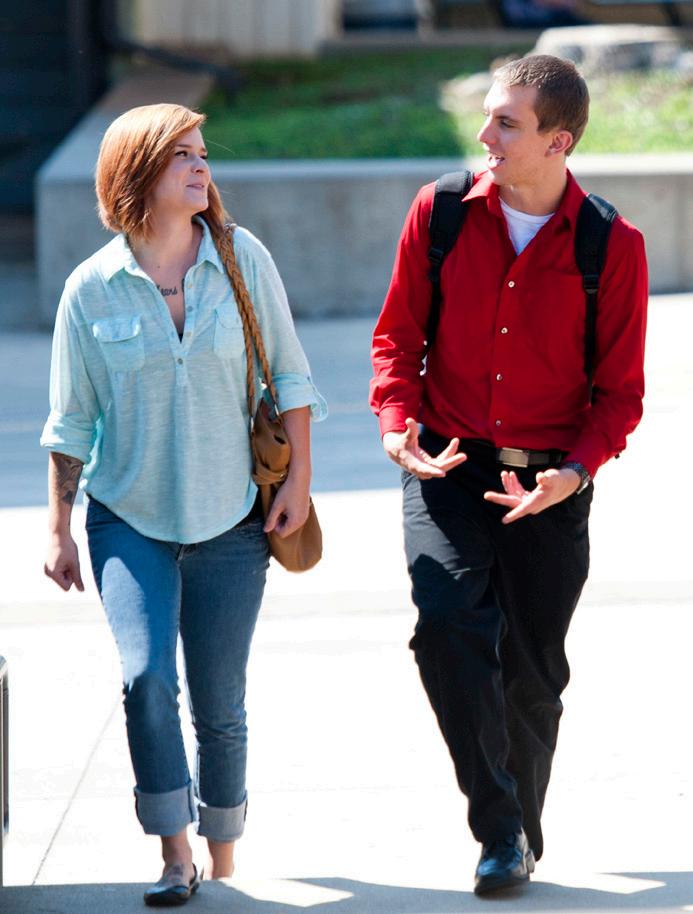
“Nearly 24,000 students who began their studies at a community college are now undergraduates on a UNC campus, accounting for more than half of all UNC transfer students,” observed UNC President Tom Ross. “This revised agreement is an important step forward in streamlining the transfer process and providing opportunities for more North Carolinians to attain a baccalaureate degree.”
Hundreds of faculty and administrators from North Carolina’s 58 community colleges and 16 UNC campuses weighed in on the design and development of this revised transfer agreement.
“Ensuring the success of this revised articulation agreement will mean we have to be more vigilant, sharing and analyzing data on student success, examining what we can do independently and collaboratively to expand and improve on this agreement,” said North Carolina Community College System President Dr. Scott Ralls.
Approximately half of Rowan-Cabarrus students intend to transfer on to a four-year college or university. A newly revised state-wide transfer agreement is helping to streamline this process for our students.
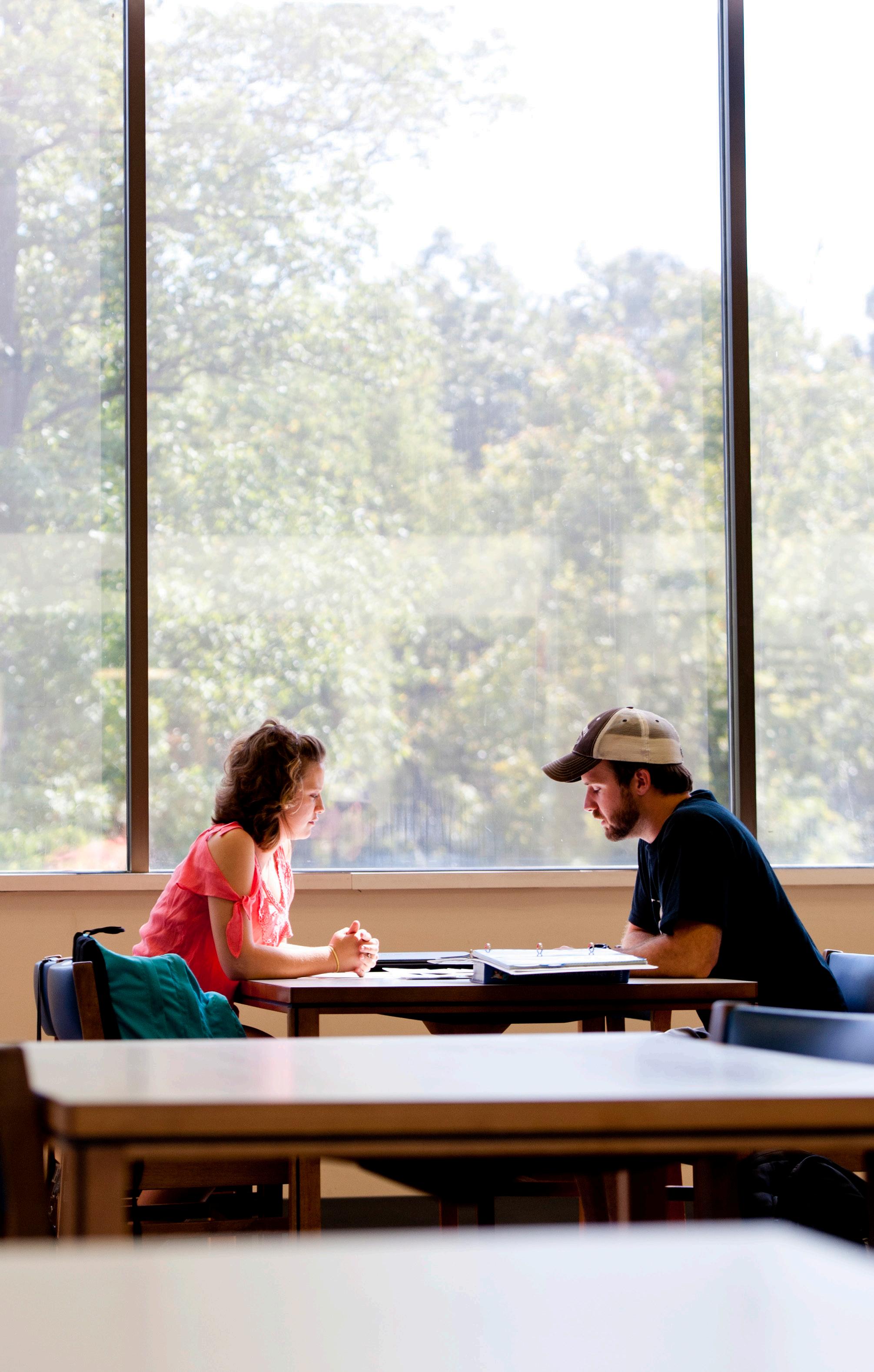
North Carolina Governor Patrick L. McCrory gave an impassioned speech about overcoming obstacles and setbacks in life during the Rowan-Cabarrus May 2014 graduation ceremony.

riday, May 16, 2014 was a big day for RowanCabarrus Community College and its students. It was the College’s 50th graduation ceremony, and North Carolina Governor Patrick L. McCrory was on hand to help send the graduates on to the next chapter of their lives.
Governor McCrory was the commencement speaker and gave the graduates a motivating speech about overcoming obstacles and setbacks in life.
Rowan-Cabarrus Community College was honored to host the state’s governor at its graduation. Having this prestigious guest speak was exciting for the graduates and their families alike.
In his remarks, Governor McCrory advised graduates to never get too comfortable with their success, embrace change and be resilient.
Governor McCrory said that after losing the gubernatorial race in 2008, his “ego was severely bruised.” Not long after, he ran into former heavyweight boxing champion George Foreman, who could tell he was feeling down. Foreman later sent Governor McCrory two boxing gloves with messages that included, “For you, the best is yet to come.”
“The message George was delivering me… was you’ve got to get back up,” said Governor McCrory. “On the other glove, (he wrote) ‘With this hand, I missed a lot, but I kept swinging.’ To each one of you, many of you to get here have gotten knocked down.… You may get knocked down again. I took his advice, and I ran for governor again.”
He told the graduates that he wants them to stay in North Carolina and continue to be successful.
In addition to hosting such a distinguished leader, the College has taken on a leadership role regionally by developing a new strategic plan, this time with a regional vision in mind.
The 2015-2018 strategic planning process began last year and has involved College faculty and staff getting together with local community leaders to brainstorm ways to improve the College and community over the next few years. The community leaders’ main message to the College was to “plan bravely.”
“It was gratifying to hear from community leaders that the College not only has solid support, but also has the ability to help lead the Rowan and Cabarrus region to greater economic security through education,” said President Spalding.
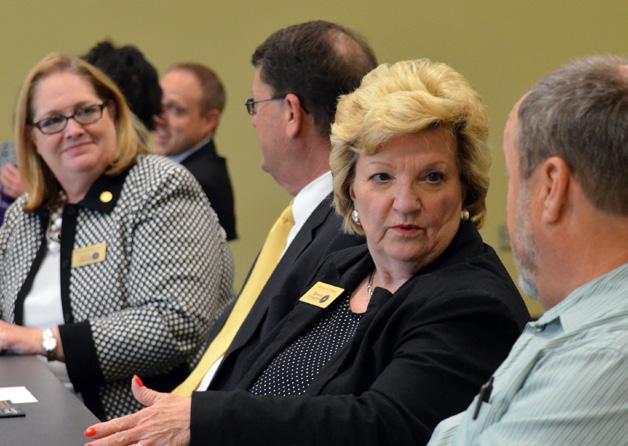


Focused planning sessions included in-depth conversations on advanced manufacturing and technology, healthcare, information technology, and STEM (science, technology, engineering and math). The new strategic plan was completed and approved by the College’s Board of Trustees in December 2014.
1. Prepare students for careers and opportunities that stimulate sustainable economic and workforce development.
2. Foster a culture of learning that inspires academic excellence and promotes student success.
3. Provide excellent service to current and prospective students, colleagues, businesses, industries, and the community.
4. Acquire, develop, and manage human, fiscal and physical resources essential to the development and delivery of technologyenriched, high value education and service.
5. Serve as a catalyst for advancing the region.
n February 20, 2014, more than 350 individuals filled a ballroom at the Embassy Suites Concord Resort to celebrate the impact of scholarships on the 2014 Rowan-Cabarrus Community College scholarship recipients.
“It was apparent to all those in attendance that a scholarship gift is the gift of education, a gift whose impact is far reaching and continues giving throughout one’s life and career,” said Katrina King, chief nursing officer for Novant Health Rowan Medical Center and co-chair of the 2014 luncheon.
In total, the 2014 Changing Lives Scholarship Luncheon generated an additional $80,000 for future scholarship recipients, adding to the significant number of scholarships in place at the College’s Foundation. Additionally, the Foundation has received $198,668 in matching funds to create an unrestricted endowment through the Strengthening Institutions Program Title III grant received by the College in 2011.
“Students and graduates of Rowan-Cabarrus Community College remain in our community, contributing to the advancement of not only their
own lives and the lives of their families, but to the betterment of our community as a whole,” said Pat Horton, president of Uwharrie Bank and co-chair of the 2014 luncheon. “The beauty of the scholarship luncheon is not only the heartwarming and altruistic nature of the event, but the impact that a scholarship has on the fabric of the larger community.”
The Changing Lives Scholarship Luncheon is a project of the Rowan-Cabarrus Community College Foundation, its 24-member board of directors, the staff of Rowan-Cabarrus Community College, the students and the community.
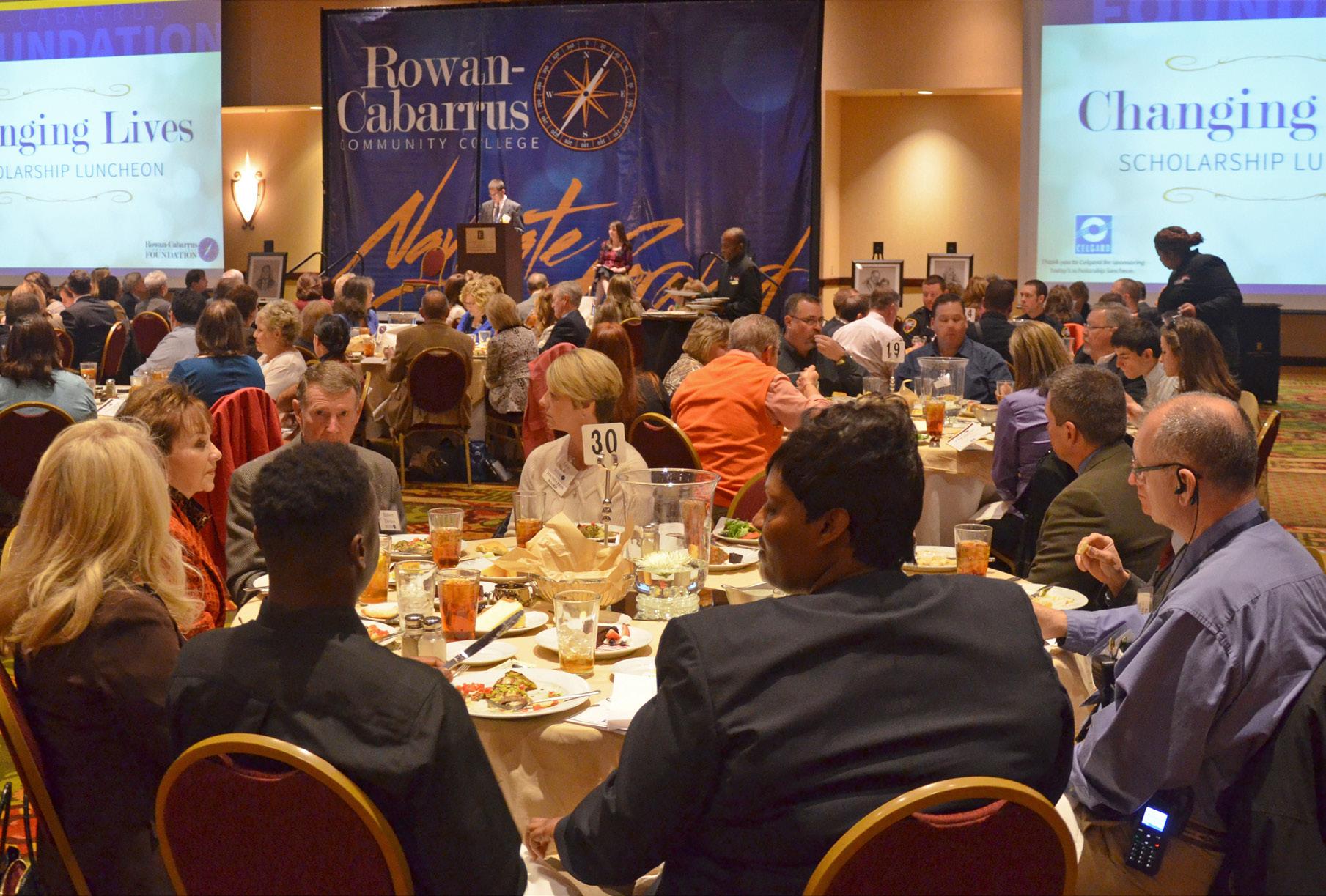
“This event truly is a highlight of the year,” said Foundation board chair Diane Honeycutt. “Residents of both Cabarrus and Rowan counties come together to support such a worthwhile effort that has such a positive impact on the future of our region.”
Newly endowed scholarships and their donors were recognized at the luncheon for making such important contributions to the education of our students.
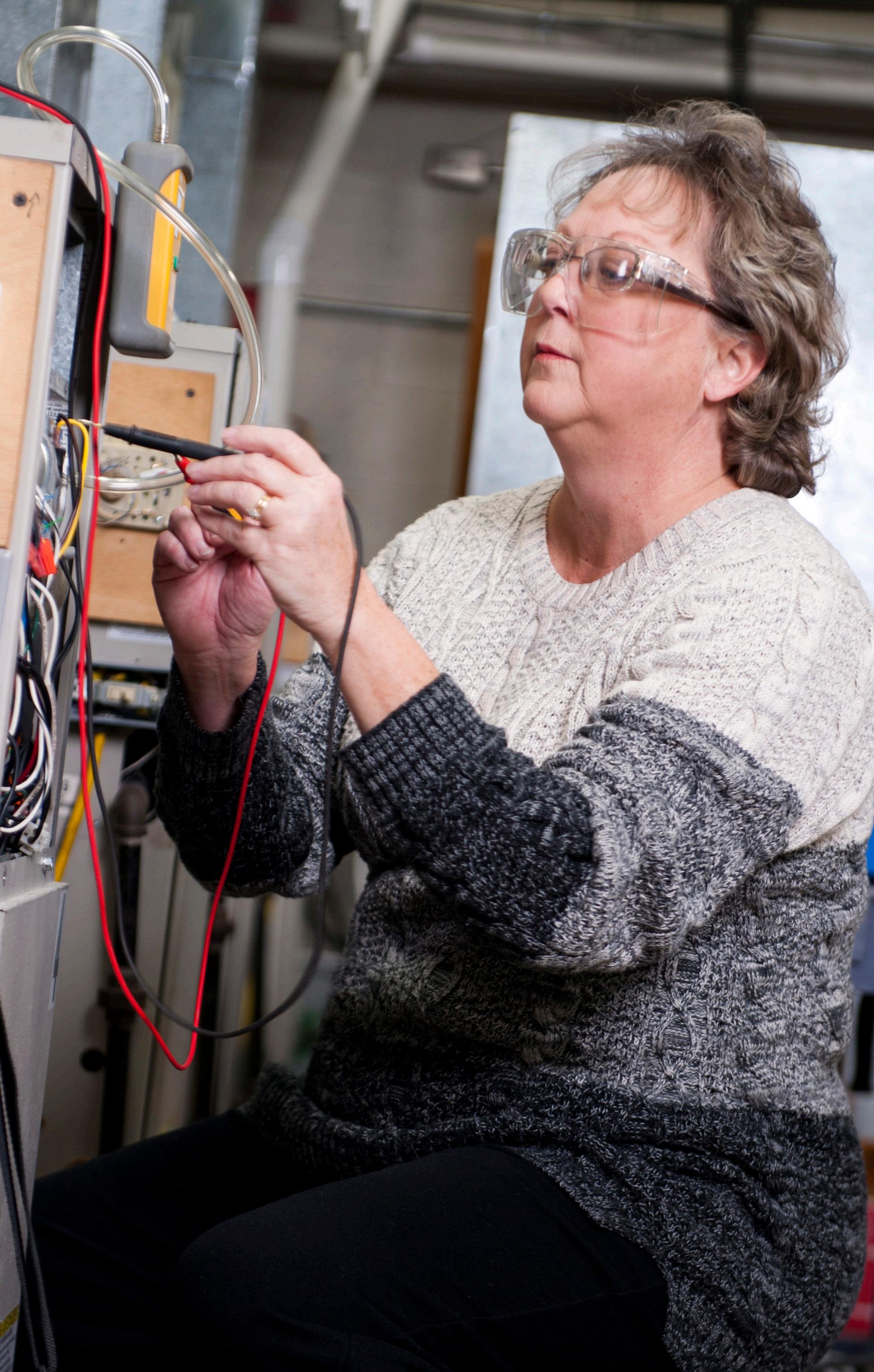 Scholarship recipient Susie Helper shared her family’s story in the annual scholarship luncheon video. She is studying air conditioning, heating and refrigeration technology here at Rowan-Cabarrus alongside her husband, Steve.
Scholarship recipient Susie Helper shared her family’s story in the annual scholarship luncheon video. She is studying air conditioning, heating and refrigeration technology here at Rowan-Cabarrus alongside her husband, Steve.

 William Cannon and Edward Norvell, co-chairs of the College’s Building a More Prosperous Community major gifts campaign, work with Chief Officer Carla Howell to raise funding for specific College needs.
William Cannon and Edward Norvell, co-chairs of the College’s Building a More Prosperous Community major gifts campaign, work with Chief Officer Carla Howell to raise funding for specific College needs.
The Rowan-Cabarrus Community College Foundation experienced a dynamic 2014. Innovative projects and a renewed commitment to utilize the Foundation as a crucial vehicle in achieving major new initiatives, alongside new leadership in the Foundation, propelled the College forward.

Public support for the College from tax dollars continues to diminish year after year, making new program development and forward movement difficult.
“The College must seek private dollars to meet our goals,” said William Cannon, Cabarrus County resident and president of The Cannon Foundation. Cannon also serves as co-chair of the College’s campaign along with community leaders from both counties who are spearheading the effort to raise these funds. “We want to invest in new programs and modern technology, ultimately training students on real world equipment so they are ready for employment upon graduation.”
Over the past two years, the College brought together community leaders and industry representatives to determine our community’s most pressing needs.
“We are asking for support – not for things that the College needs, but what we believe the community needs,” said Edward Norvell, Rowan County resident, attorney and co-chair of the College’s campaign.
The Building a More Prosperous Community major gifts campaign, launched in spring of 2014, brought a new and exciting chapter for the Foundation as
the first large fundraising campaign in the 50-year history of Rowan-Cabarrus Community College.
The campaign, with a goal of raising $7.1 million, is centered on four key initiatives that address specific needs for the College, including a new advanced technology center, healthcare education, an outdoor learning and amphitheater space, and STEAM scholarships for students pursuing science, technology, engineering, art and mathematics.
In addition to the four main initiatives, the College is also seeking funds for two additional special projects – a solar energy investment and the expansion of the world class Fire & Emergency Services Training Facility.
“The College was honored to receive its largest donation to date from esteemed philanthropists, Fred and Alice Stanback, featured above. Their one million dollar donation will support the College’s Building a More Prosperous Community campaign and solar energy project,” said Carla Howell, chief officer of governance, foundation, and public relations.
In addition to the launch of the major gifts campaign, the Foundation experienced many highlights in 2014 including the Sixth Annual Rowan-Cabarrus Community College Foundation Golf Classic, which raised more than $17,000 for the Foundation. The Foundation also awarded numerous grants to College faculty and staff who use them to impact students, and to continue assisting with special emergency financial needs of students.
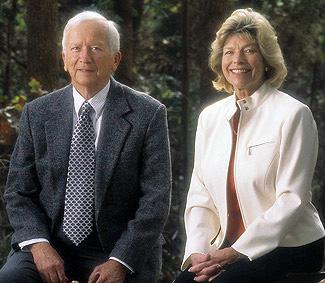
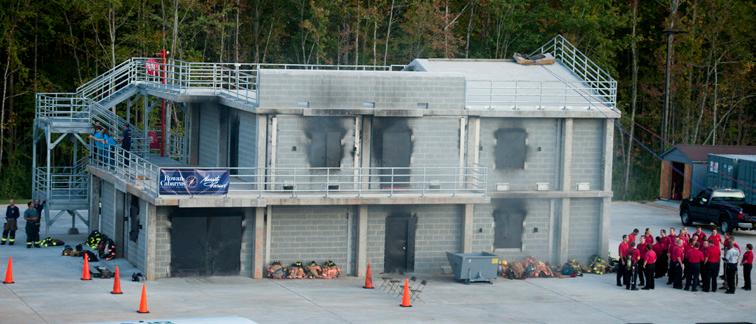
“A Year of Progress” is an apt theme for the College’s 2014 Annual Report – especially when considering all of the construction on campus.

Our North Campus in Salisbury is experiencing both additions and renovations. Thanks to the 2010 Rowan County bond referendum, the College is currently adding a small addition to the North Campus health sciences building. Rowan-Cabarrus is also making many renovations to the 50-year old campus, including updating our accessibility, and turning an administrative building into a classroom building. Also on North Campus, the first of the 2010 Rowan County bond projects was completed with the grand opening of the new Fire & Emergency Services Training Facility.
The South Campus in Concord, which enrolls nearly 10,000 students, is getting a new one-stop center called Navigation Station that places all student services in one easy-to-access location. The College completed a similar space on North Campus in 2013.
The College also spent 2014 working to find a new home for the cosmetology program. The College is currently in the process of moving the cosmetology program (currently located at Cloverleaf Plaza) to 120 West Ave., Kannapolis. That renovation, to be completed in 2015, will represent an expansion of that program, as the
College always has a waiting list for these daytime classes. This move, supported financially by both Cabarrus County and the City of Kannapolis, will be an economic development engine for the Kannapolis Village. In fact, Rowan-Cabarrus has been told that businesses and restaurants are moving, or are planning to move, back to Kannapolis Village since finding out about the Cosmetology program relocation!
Additionally, both North and South Campuses are in the process of getting updated signage to properly and boldly identify the campuses. These new signs will have more prominent placement than previous signs and include the College’s new brand.
The RowanCabarrus Student Ambassador Program is a group of outstanding students who are selected to represent the College in multiple capacities. Student ambassadors reach out to prospective students, conduct campus tours, participate in and help promote various College events and assist with the successful transition of students to the campus.
“I’m very proud of the Rowan-Cabarrus Student Ambassador Program and this year’s new group of leaders,” said President Spalding. “We believe that developing our students into community leaders and active citizens is a part of our mission at the College. These students will definitely leave RowanCabarrus equipped to lead in their careers and communities.”
The 2014-15 Rowan-Cabarrus Student Ambassadors include:
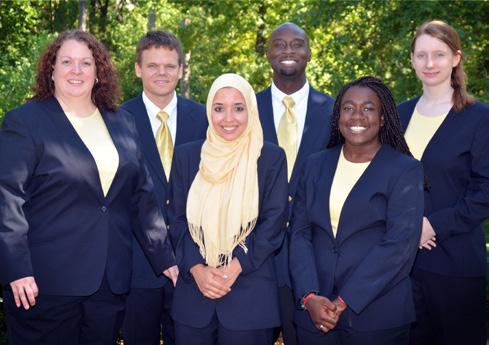
• Sarah Cook of Landis, Associate in Arts
• Shawn Henderson of Salisbury, Associate in Applied Science, Business Administration
• Kelly Hill of Salisbury (Senior Ambassador), Associate Degree Nursing
• David Perry of Huntersville, Associate of Arts
• Roa Saleh of Harrisburg, Diploma
• Chelcie Williams of Kannapolis, Associate in Arts
Student Ambassadors are dedicated to student success, diversity and strengthening student connections. Ambassadors enjoy working with people, are committed to creating change in their respective communities, and are excited about sharing their experiences at Rowan-Cabarrus with others. The program is supported by the RowanCabarrus Community College Foundation. Student ambassadors earn a scholarship for their service to the College.
Six-hundred thirty GED students graduated from Rowan-Cabarrus with their high school equivalency diplomas in 2014. This represents the largest number of GED graduates in the College’s 50 year history.
“The GED test opens the door to college and better jobs. It gives the graduates the respect they deserve, and the satisfaction of earning a high school credential with the hope that they will continue with their education,” said Gary Connor, director of the College’s GED and Adult Basic Education programs.

Graduates ranged in age from 17 to 66, with an average age of 28. Forty-four percent of the GED graduates live in Rowan County and 56 percent are from Cabarrus County, with 51 percent female and 49 percent male. Further, among these GED graduates is the largest percentage of students moving directly on to college courses at Rowan-Cabarrus.
During 2014, the College participated in a program that allowed potential test-takers free GED

practice tests during a select window of time. Additionally, as part of the College’s efforts to keep costs as low as possible, Rowan-Cabarrus has been offering students who enroll in the GED program the option to apply for funding that would cover the cost of the test fees.
“I don’t want students to abandon their GED efforts because of a cost factor,” said Gary.
Rowan-Cabarrus provides both instruction and resource materials to students preparing for the GED at no cost. Classes are scheduled on the North and South Campuses and at a variety of community locations for convenience and access.
“Our goal is to bring education to the students. It’s our ‘meet them where they are philosophy,’” said President Spalding. “While it’s not possible for every program, our overarching goal is to be available and accessible to students. That’s why our students can now earn numerous degrees completely online. It’s why the GED classes are offered morning, afternoon, evening, online and at multiple locations across the College’s service area.”
Students work at their own pace, so the time to complete a section of the GED may take weeks or months based upon the individual readiness for the test.

The College is embarking on a unique publicprivate partnership for solar energy at RowanCabarrus Community College.
The public-private partnership for a solar energy system would develop a potential $3.4 million system with the capacity to generate approximately 1,500,000 kilowatt-hours of electricity per year on average. This would offset up to 2,000,000 pounds of carbon dioxide annually throughout its serviceable lifetime of 30 years or more.
“In our efforts to make our money go further and raise private funds, we became aware of an opportunity for a public-private partnership that creates cost-savings for our college, jobs within our community, and a return on investment for our supporters,” said Dr. Carol S. Spalding, president of Rowan-Cabarrus.
Rowan-Cabarrus is currently undergoing major renovations around its campuses, especially the North Campus in Salisbury.
“Our vision at Rowan-Cabarrus is to build sustainable futures through the power of learning,” said President Spalding. “Sustainability is a key part of our work here and taking a serious look at solar energy options makes a lot of sense.”
Through developing a solar energy project, the College would be positioned to save at least $700,000 over the lifetime of the solar panels (approximately 30 years) in reduced utility bills. Consultants from The Appalachian Institute for Renewable Energy (AIRE) believe the savings might
reasonably exceed $1 million when considering the rising cost of energy and inflation.
“Investors in these projects can truly do well by doing good,” said Jeffery Deal, senior project manager with AIRE. “The development process is tried and true, achieved by taking advantage of federal and state tax credits, deductions and energy sales. This same type of development has been used by Duke Energy to build 11 utility scale wind farms throughout the United States to produce megawatts of solar energy across North Carolina. All told, the utility has invested $2.5 billion in this type of energy development.”
The lead donor on this initiative for the College is esteemed philanthropist, Fred Stanback.
“Fred’s million dollar donation, the largest donation the College has ever received, will support our solar energy project, ultimately saving Rowan-Cabarrus and local taxpayers in long-term energy costs. We couldn’t be more grateful for his confidence and generosity,” said President Spalding.
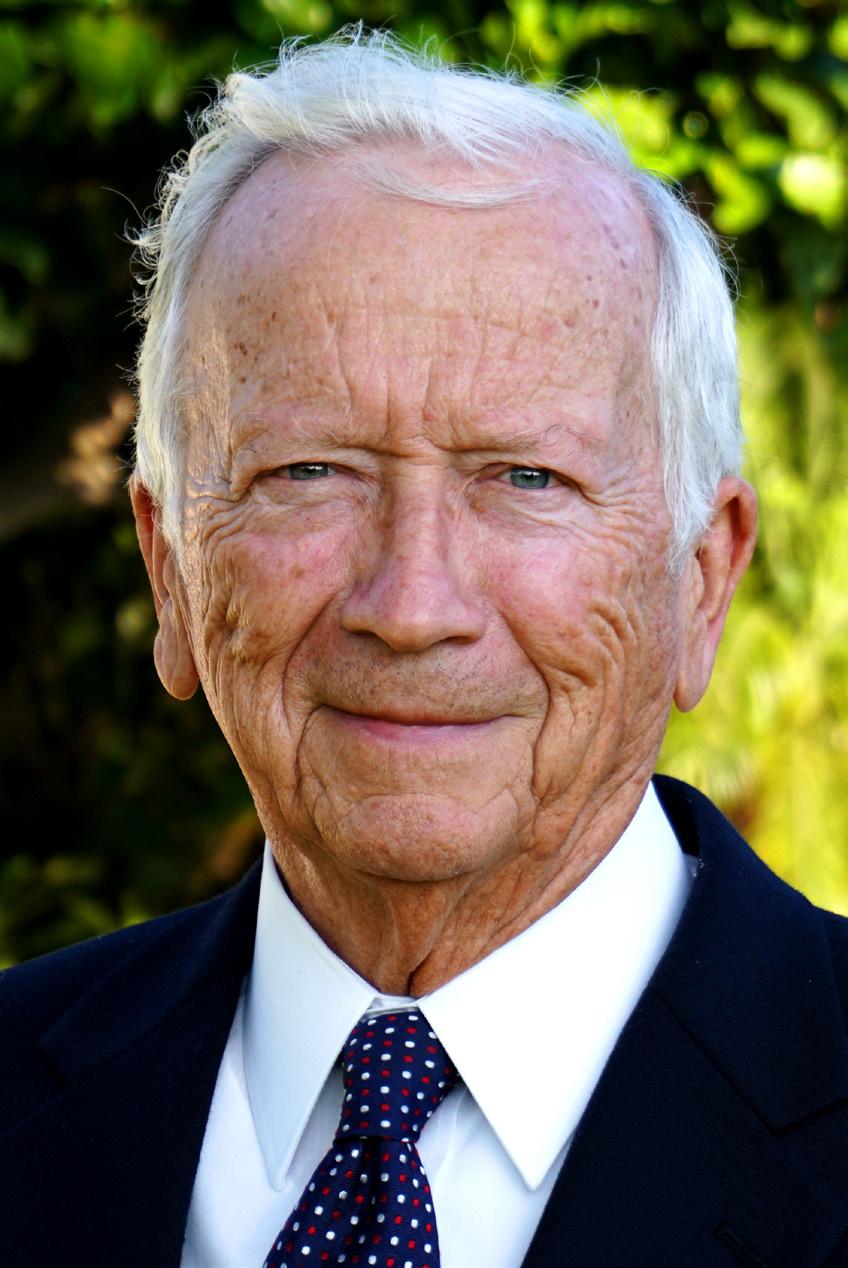 Philanthropist Fred Stanback honored the College with its largest donation to date, a one million dollar donation to support the College’s new solar energy project.
Philanthropist Fred Stanback honored the College with its largest donation to date, a one million dollar donation to support the College’s new solar energy project.
The College’s 2014 Outstanding Excellence in Teaching Awards were awarded to Carol Beaver, full-time nursing instructor, and Tabelech Shipp, part-time chemistry instructor.
Carol Beaver, RN, MSN, OCN®, received a B.S. in Nursing from Lenoir-Rhyne College and an M.S. in Oncology Nursing from Duke University, with additional courses in nursing education. She served 24 years as an oncology/chemotherapy nurse with Carolina Oncology Associates in Salisbury before joining Rowan-Cabarrus.
By receiving the Outstanding Excellence in Teaching Award, Carol becomes the College’s nominee for the 2014 North Carolina Community
College System’s R.J. Reynolds Excellence in Teaching Award.
Tabelech Shipp has a Master of Life Sciences with dual concentrations in biology and chemistry from the University of Maryland at College Park and a B.S. in Professional Chemistry from North Carolina Agricultural and Technical State University. She joined the faculty at Rowan-Cabarrus Community College in 2002.
The selection process includes nominations from students and requires the instructor to develop a full portfolio.
“Rowan-Cabarrus Community College has a long and proud tradition of hiring highly qualified and dedicated faculty in all of its academic programs,” said President Spalding. “Carol Beaver and Tabelech Shipp are representative of this tradition. These faculty members, and many others, do a wonderful job of providing top-quality instruction to the students at Rowan-Cabarrus.”
The College has spent the last year focused on wrapping up its Compliance Certification Report, which will be submitted to the Southern Association of Colleges and Schools Commission on Colleges (SACSCOC) in early 2015.
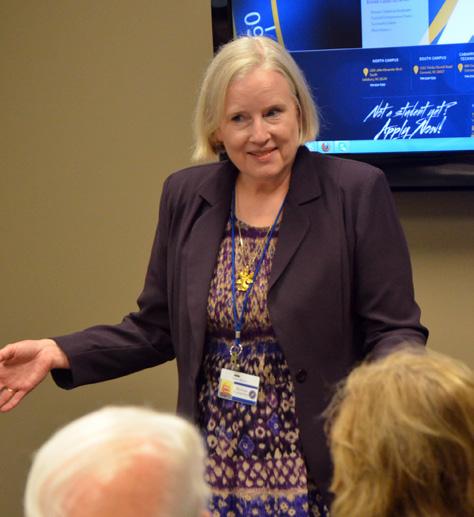
The report is the next step in the College’s reaccreditation process that takes place every 10 years.
“Our accreditation is vitally important to the work that we do. Our accreditation makes our degrees worth something – it validates that our graduates have undertaken and completed a rigorous challenge,” said President Spalding. “Getting accredited by SACSCOC is becoming much harder, in part, because of requirements set by the federal government.”
Rowan-Cabarrus has been working on reaccreditation for about 18 months.
SACSCOC is the regional body for the accreditation of degree-granting higher education institutions in the Southern states. It serves as the common denominator of shared values and practices among the diverse institutions in Alabama, Florida, Georgia,
Kentucky, Louisiana, Mississippi, North Carolina, South Carolina, Tennessee, Texas, Virginia and Latin America and other international sites approved by the Commission on Colleges that award associate, baccalaureate, master’s, or doctoral degrees.
Another area the College has been working on for months is updating policies, a step required by SACSCOC.
“As we have been preparing for our SACSCOC reaccreditation, I want to thank all of our faculty and staff who have developed written narratives and updated our college policies and procedures,” said President Spalding.
Wording needed to be updated on many of the policies. However, some new ones were created, many of them stating processes the College already followed. In fact, since 2013, the College has updated over 150 policies and procedures.
Rowan-Cabarrus is also pleased that, as part of this process, the updated and approved policies and procedures are now available on SharePoint, the College’s internal website.

The purpose of the Rowan-Cabarrus Foundation is to raise and manage funds, and enhance relationships that support the work of Rowan-Cabarrus Community College. Our vision is to set the standard of philanthropic support for 21st Century learning by 2015.
Thank you to the following individuals for contributing to the Rowan-Cabarrus Foundation from January 1, 2014 to December 31, 2014.
Robert Abbate
Eddie Ables
Deana Adams
Tony Adams
Greg and Melissa Alcorn
Keri Allman
Tony Almeida
Brenda Almeyda
William and Debbie Anderson
Kenneth Anderson
Dean and Betty Andrews
Greg and Cordelia Andrews
Michael Applegate
Carolyn Arey
Denise Askew
Barbara Atwell
Janice Barnes
Ronald Barnes
Kim Barnett
Wendy Barnhardt
Deborah Barrett
Jan Beatty
Diane Beaver
Jenny Beaver
Tripp and Carol Beaver
Jade Bittle
Marion Bish
Gary Blabon
Jenny Bodenheimer
Reg Boland, III

Dan and Teena Boone
Ronnye Boone
Timothy Bost
Tom Bost
Bob Brannan, III
Linda Brilliant
Alfred Brown, Jr.
Angela Brown
Carolyn Brown
Paul and Melissa Brown
Ralph Brown
Tracey Brown
Tracie Pfaff Brunt
David and Patricia Burke
Jennifer Canipe
Bill and Ann Cannon
Carolyn Carpenter
Jessica Castrodale
Adeline Caton
Amy Caudle
Jonathan and Cameo Chamberlain
Cathy Chandler
Jerry and Connie Chandler
Marcus Childs
Joe Christie
Terry Clanton
Brenda Clement
Ken Clifton
Lisa Cline
Carla Cole
Lisa Conger
Gary Connor
Cheryl Cooke
Randy and Sheila Corriher
Lynn Coughenour
Patrick Coughlin
Daryl Cox
Martha Cranford
Joan Creeger
Donna Crook
Timothy Crosby
Sue Cunningham
Anne Curlee
Margaret Dabbs
Michael Chreitzberg, partner in the architectural firm of Yates Chreitzberg Hughes Architects. In 2014, the Michael Chreitzberg Endowed Scholarship was given by Dennis Yates to honor his colleague and business partner, Michael Chreitzberg.Dene Dawson
Joyce Deal

Eric Dearmon
Deaven Demarco
Susan Denton
Troy and Paula Dibley
Bonnie Dickerson
Brent Doolan
Zeb Shue and Lou Dorton-Shue
Mike Downs
Vera Drye
Christina Dryman
Harold Earnhardt
Mark Ebersole
Randall and Jody Edwards
April Elrod
Jean Enyeart
Nekita Eubanks
Tanya Evans
Ervin Fesperman
Locke and Cathy Floyd
Lynne Fogner
Tim Foley
Pam Forrest
Kathy Fountain
Susan Fradkin-Ferris
Bennie and Patricia Fulcher
Donald Gariepy
Jessica Gaskill
Keith Gehl
Cody Gilchrist
Douglas Glasgow
Crystal Glenn
Gwynn Goodman
Karen Gordon
Angela Graham
Ricky Gray, Jr.
Cora Greene
Jimmy Greene
Shirley Greene
Charlotte Grossman
Barbara Hall
Maria Hall
Denise Hallett
Susan Harden
Dina Harkey
Laura Harper
Doug Hartjes
Michael and Tina Haynes
Adam Helmintoller
Carolyn Helms
Sarah Hensley
Frank Higginbotham, III
Michael Hodge
Veronica Hodges
Al Hoffman
Carolyn Holbert
Brenda Honeycutt
Diane Honeycutt
Ricky Honeycutt
Pat Horton
Jack Howard
Dwight and Carla Howell
Sandy Howell
Bob and June Hundley
Joseph Hunter
Nikki Iadarola
Ken Ingle
Marie Izzo
Jennifer Janes
Susan Jensen
Kathryn Johnson
Starling Johnson
Steven Johnson
Barbi Jones
Jane Jones
Chrystal Joy
Linda Kamp
Holli Kempton
Roberta Kern
Ralph Ketner
Tom Kincaid
David and Katrina King
Jeff King
Autumn Kinnaird
Phil Kirk
Allison Kitfield
Kathy Knight
Robert Knuschke
Lisa Kraft
Craig Lamb
Krista Lambert
Lisa Lancaster
Lisa Ledbetter
Judy Lee
Theresa Leflore
Joseph Leviner
Ronnie and Daphne Lewis
Amelia Likin
Sue Lilly
Debbie Lineberry
Jackie Linker
Bob Lippard
Rodney Lippard
Natasha Lipscomb
Nancy Litton
Christopher Lowder
Gail Lowder
Stan and Donna Ludwig
Karen Lynden
Christine MacKubbin
Ernest Macon
Cheryl Marsh
Cynthia Martens
Tena Martin
Brenda Mauldin
Gaye McConnell
Betty McCrary
Melody McGinnis
Brandie McHale
Terri McKnight
Barb Meidl
Elana Miles
Karen Mitchell
Molly Mollohan
Jack and Jeanie Moore
Linda Moore
Robin Moore
Kyndall and Sandy Moore
Amy Moorhead
Caren Morgan
Gary Morgan
Ann Morris
James Morse
Amanda Myers
Diana Myers
Muriel Myers
Cyndie Mynatt
Grace Mynatt
Sherie Neely
Debra Neesmith
Irvin and Sara Newberry
Roy Nixon
Edward and Susan Norvell
Falon Nye
Allen Overcash

Ginger Pack
Ray and Lois Paradowski
Tim and Ruth Parker
Connie Paxton
Jacqueline Pearce
Shawn Peters
Larry Pittman
Cassie Plott
James Price
Christine Promin
Kelly Propst
Patricia Propst
Connie Ragle
Emma Randall
Stan Reece
Velma Reese
Damon Richard
Marty Richards
Michelle Riley
Dennis Rivers
Katharyn Robertson
Brent Rockett
Maria Rodriguez
Jennifer Rosalino
Peggy Rummage
Ellen Rush
Angie Rusmisel
James Rutledge
Joe Rutledge, III
Crystal Ryerson
Colleen Sain
Dusty Saine
Tom Sanctis
Victoria Sanders
Robin Satterwhite
Eric Savage
Carol Scherczinger
Denise Schweizer
Ron Scozzari
Jenn Selby
Robin Seropian
Colin Shaw
Lillian Shirley
Lisa Shores
Carl Short, Jr.
Kewanna Sloan
Betsy Smith
Brenda Smith
Hayes and Susan Smith
Jeffrey Smith
Kenan and Tracy Smith
Miles and Kathy Smith
Pat Smith
Robert and Susan Smith
Tommy Smith
Carol Spalding and Francis Koster
Elaine Spalding
Douglas and Janet Spriggs
Betty Stack
Tricia Staggers
Fred and Alice Stanback
William and Nancy Stanback
Vickie Starnes
Ian Stevens
Sara Swager
Lara Swenson
Claudia Swicegood
John Szakal
Chad Tarlton
Jay Taylor
Kathy Taylor
Barbara Taylor-Lineberry
Julie Thoman
Rod Townley
Ashlinn Trexler
Ellen Troutman
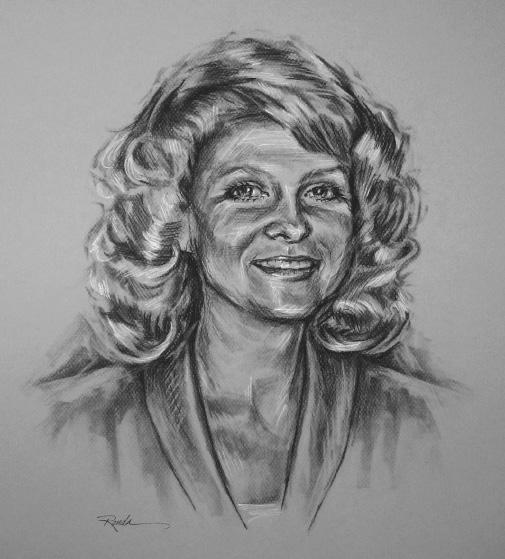
Jacqueline Tucker
Lisa Tucker
In 2014, the family of Edna J. Chrin created a memorial fund. The Edna J. Chrin Endowed Scholarship was funded by Mrs. Chrin’s daughter and son-in-law, Paula and Troy Dibley.Robert and Carolyn Tucker
Amy Turner
Robin Turner
Ed Tyson, II
Zeena Upchurch
Dakeita Vanderburg-Johnson
Kathy Vestal
Bill Wagoner
Holly Wagoner
Robert and Sarah Walker
Tammara Walker
Linne Wallace
Pat Wannamaker
Jim and Kathy Waters
Brenda Weaver
Sheryee West
Tammy Whaley
Debra Whiting
Patsy Whitley
Nancy Whittaker
Brad Williams
Carter Wingfield
Len Witke
Joe Woodall
Paul and Beth Woodson
Quentin Woodward, Jr.
Belinda Wyatt
Michael and Courtney Wyatt
Betty Yates
Dennis Yates
Thank you to the following corporations, foundations and organizations for providing sponsorships, grants and contributions to special projects of Rowan-Cabarrus in 2014.
Azko Nobel Corporation
Allied Barton Security Services
Anonymous
Autumn Corporation
Barnes & Noble
Ben Mynatt Family of Dealerships
Boomerang Design/MBAJ Architecture
Brown & Miller Racing Solutions
Cabarrus College of Health Sciences
Cannon Foundation, Inc.
Castle & Cooke, LLC
Celgard
Cengage Learning

Central Piedmont Builders
Century 21 Town & Country
City of Concord
Clancy & Theys Construction Company
Clifford A. & Lillian C. Peeler Family Foundation
Cloninger Ford-Toyota-Scion
CM Black Construction Co., Inc.
Colonial Life Insurance
Duke Energy Foundation
Eaton Cummings Group
ECS Carolinas, LLP
F & M Bank
First Bank
Fite’s Professional Services, LLC
FMC Corporation

Gem Theatre, Inc.
Godley’s Garden Center
Hilbish Ford Lincoln Mercury
Honeywell Building Solutions
IBM International Foundation
Innovation Research & Training, Inc.
J.F. Hurley Foundation
Johnson Concrete
Krueger International
KS Image Solutions, LLC
McCracken & Lopez
McLaughlin Young Group-EAP
Morris-Berg Architects
Moseley Architects
Normans Janitorial Service
Novant Health - Rowan Medical Center
Pease Engineering & Architecture, PC
Piedmont Brick Sales
Potter & Co. P.A.
Providence United Methodist Church
Rinker Commercial Properties
Rowan-Cabarrus SGA
Rowan County Commissioners
S & D Coffee
Salisbury Lions Club
Solace Salon & Spa at the Rossean House
Southgate Masonry & Lumber Co., Inc.
Taylor Clay Products Co., Inc.
Team Honeycutt - Allen Tate Realtors
The Bookman USA
The Charles A. Cannon Charitable Trust
The Margaret C. Woodson Foundation, Inc.
Tim Schenk Electric, Inc.
Time Warner Cable
Toyota Motor Sales, U.S.A., Inc.
Utica National Insurance, Inc.
Uwharrie Bank
Vulcan Materials Company
Wayne Brothers, Inc.
YCH Architects
Families, friends and businesses honor and memorialize individuals, corporations and students through endowed gifts to the Foundation. Endowments are established and invested with a minimum gift of $15,000 and are permanent funding sources for programs, scholarships and other financial assistance. These funds provide the annual earnings to support these awards.
Ambassadors ($250,000 +)
Ralph W. Ketner Family Endowed Scholarship
Philip Morris USA Endowed Scholarship
RCCC General Scholarship Fund
Advocates ($100,000+)
Benson/DeBerry Memorial Endowed Fund for Academic Excellence
Food Lion Endowed Scholarship
Dr. Richard L. Brownell Endowed Fund
Ervin W. and Miriam R. McCulloch Scholarship Fund
Edith Walker Estate Memorial Endowed Scholarship
Champions ($75,000+)
AkzoNobel Corporation Endowed Scholarship
Partners ($50,000+)
Dean R. and Betty I. Andrews Endowed Scholarship
Evelyn Kenerly Germann and William Joseph Germann Memorial Endowed Scholarship
Dai Nippon Endowed Scholarship
Edward and Susan Norvell Scholarship Endowment
Promoters ($25,000+)
Cabarrus Rescue Squad Endowed Scholarship
Lane C. Drye Memorial Endowed Scholarship
Susan Elaine Harrison Memorial Endowed Nursing Scholarship
The Salisbury Lions Club Clyde H. Harris Memorial Endowed Scholarship
Susan J. and Robert M. Smith Endowment
William and Nancy Stanback Scholarship Endowment
Waddell Professional Development Fund
Endorsers ($15,000+)

Walter Almeida Endowed Scholarship
Brown Family Fire Protection Technology Endowed Scholarship
Dr. Jarrett T. Chandler Endowed Scholarship
Michael Chreitzberg Endowed Scholarship
Edna J. Chrin Memorial Scholarship
Larry Cloninger Family Endowed Scholarship
Helen B. Earnhardt Memorial Scholarship
Rachel B. Gaskey Memorial Scholarship
Sam R. and Louise May Endowed Scholarship
Graham Spencer Endowed Scholarship
Ben Mynatt Memorial Scholarship
RCCC Student Emergency Scholarship Fund
Other Endowed Funds
C.C. Erwin Memorial Endowed Scholarship
China Grove Civitan Memorial Endowed Scholarship
Michael A. Johnson Scholarship
Concord Rotary Club Endowed Scholarship
Draft and Design Endowed Scholarship

National Tool and Machinery Endowed Scholarship
C. T. Overton Endowed Scholarship
RCCC General Endowed Scholarship Fund
Gifts of $1,500 or more may create a named scholarship or program fund. Contributions at this level offer the financial support for successful completion of a certificate, diploma or degree. Program funds provide enhancements to the classroom and learning experience.
Bobbie Lois Lusk Abshire Scholarship
Alcorn Scholarship Fund
Boomerang Design Scholarship Fund
Patricia Burke Scholarship Fund
Clancy and Theys Scholarship
Gerald Cox Family Scholarship
F&M Bank Merit Award
Anthanasius Fote Scholarship
Equipment and Technology Fund
Friends and Family Scholarship
Godley Garden Center Fund
The Maria Hall Emergency Assistance Fund
Al Hoffman Scholarship
Honeycutt, Horton, Brogdon and VanderburgJohnson Scholarship
RCCC Literary Scholarship Fund
Gernal “Buddy” Lowman Honorary Scholarship
Mechanical Trades Carolina Scholarship
Lillian C. Peeler Memorial Scholarship of the Salisbury Women’s Club
Nadine Potts and Jo Franklin Excellence in Nursing Scholarship
Dr. L. H. “Pete” Robertson Jr. Radiography Scholarship
Shoe Show Scholarship
Southgate Masonry Scholarship
RCCC Student Emergency Scholarship Fund
RCCC Student Impact Grant Fund
Hilton J. Swindell Memorial Scholarship Fund
Weyerhaeuser Giving Fund-U.S. for S.T.E.M. Scholarships
The Margaret C. Woodson Foundation Scholarships
The John Wyatt Nursing Scholarship
Skills USA/Lowe’s: Vouchers for students who complete safety training – $2,925
Duke Energy:
Funding to support advanced green welding by equipment upgrades and expansion –$247,453
The Margaret C. Woodson Foundation: Annual scholarships and emergency funds – $35,000
NCCCS (Minority Male Mentoring Program): Funding to support for the Minority Leadership Academy – $15,228
The Cannon Foundation, Inc./Cannon Trusts: Funding for critical North Campus infrastructure and Advanced Technology Center concept design – $505,000
Weyerhaeuser: Scholarships – $1,000
Rowan County Tourism Board: 2015 NCCC Fine Arts Mini-Conference: The Big Picture – $1,540
NCCCS (Perkins):
Funding for career and technical education in student services and curriculum – $355,219
NCCCS (Perkins): 20 month grant for HS-CC Career PathwaysNursing Assistant to RN – $35,000
U.S. Dept. of Labor: Trade Adjustment Assistance Community College Career Training Grant - Four-year project, Forsyth Tech is lead of National College Consortium for life science certifications –
$6,343
National Science Foundation (NSF): Five-year grant providing paid internships for 12 Rowan-Cabarrus STEM students to explore careers in K-12 education – $65,686
U.S. Dept. of Education: Title III Strengthening Institutions Program - Five-year grant to support success through advising and academic interventions –

$394,053
Total for 2014: $1,664,447

1. Prepare students for 21st Century careers and opportunities that stimulate sustainable economic and workforce development.
A. Enhance current and develop new education and training programs to prepare students for existing and emerging careers.
1. Opened College’s new, world class Fire & Emergency Services Training Facility and held a grand-opening event for hundreds of local residents, which showcased the new training opportunities available.

2. Developed five new associate degree programs: Advertising & Graphic Design, Emergency Medical Science, Occupational Therapy Assistant, Physical Therapist Assistant, and Nurse Aid Certificate.
3. Awarded over 270 free Microsoft certifications to Rowan-Cabarrus students and members of the community at the Microsoft Technology Associate (MTA) Test Fest.
B. Lead local and regional Science, Technology, Engineering & Mathematics (STEM) initiatives.
1. Hosted third annual STEM Open House at RCCC@NCRC attended by K-12 students and community members.
2. Placed 12 students in the Noyce Exploratory Internship Program with the National Science Foundation Noyce Scholars program at Discovery Place, Catawba Center for the Environment, New Horizons in Rowan County and others.
3. Participated in a national consortium funded by the Department of Labor through the Trade Adjustment Assistance Community College and Career Training Grants Program (TAACCCT) to develop industry-recognized biotechnology credentials.
4. Led a state-wide nursing curriculum revision project for Practical Nursing and Nursing Assistant through a collaborative, state-funded project with sixteen other North Carolina Community College nursing faculty.
C. Provide accessibility and support to meet student needs.
1. Served over 5,000 students through the Academic and Career Advising Center during year three of the Title III grant.
2. Provided over 2,500 hours of tutoring to students at multiple campuses at no incremental cost to the College staffed by 35 full-time faculty volunteers.
3. Provided 1,599 synchronous online tutoring sessions (nearly 750 hours).
4. Provided over 18,000 hours of corporate and continuing education training to more than 2,000 clients through employability labs, workshops, classes, and one-on-one coaching, focusing on workplace skills competencies and development of soft skills.
D. Increase completion rates by providing learning options that lead to certifications, diplomas, and degrees by participating in the American Association of Community College’s (AACC) National Completion Agenda.
1. Celebrated over 960 curriculum graduates in May 2014, with about 100 students receiving their high school diplomas as part of the College’s two early college high school programs.
2. Increased Medical Office Administration program students certificate completion by 474 students (465 percent). Increased student award of multiple certificates by 383 students (981 percent).
3. Awarded over 17,000 fire and emergency medical services (EMS) personnel 7,500 certifications and 200,000 hours of training.
4. Provided over 260,000 hours of in-service training for public safety personnel, resulting in approximately 13,000 professional public safety certificates.
5. Issued 462 Career Readiness Certificates (CRCs), which validate workforce readiness.
6. Awarded 632 General Education Diplomas (GED), the largest number in the College’s history.
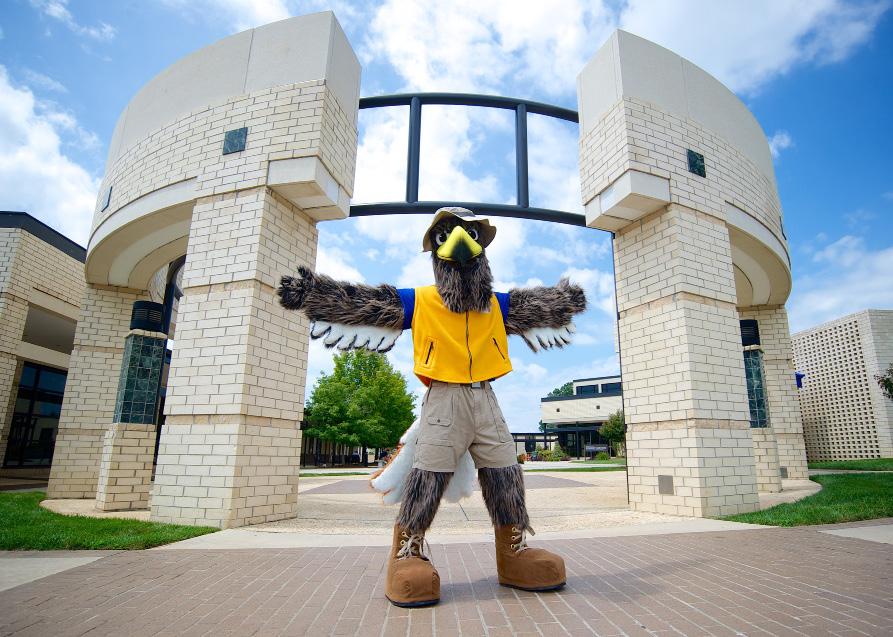
E. Accelerate degree completion by leveraging options (CLEP, SOC, ACE, CAEL, portfolio, work experience, internal articulation, etc.).
1. Established a baseline for the new Quality Enhancement Plan (QEP) focused on career development, including classroom emphasis on job shadowing, career research, resume writing, interview preparation and internship and cooperative education opportunities.
2. Produce exceptional learning that demonstrates academic excellence and student success.
A. Enhance superior learning outcomes by acquiring updated teaching and assessment skills through professional development.
1. Provided a two-day training and professional development program to 145 individuals (67 full-time faculty, 35 part-time faculty and 43 staff) through the Center for Teaching and Learning (CTL), focusing on instructional techniques, resources, student retention/engagement, technology and student advising.
2. Maintained status as one of four colleges nationwide with Quality Matters certification.
B. Promote student success by implementing additional effective teaching methods.
1. Received a $247,453 grant from the Duke Energy Foundation to integrate virtual reality welding into the traditional welding
curriculum to enhance the quality, quantity and efficiency of training and instruction.
2. Trained 575 students from 21 fire departments on the newly constructed Fire & Emergency Service Training Grounds.
3. Achieved a Quality Matters national award for online teaching methodology.
C. Continue to implement and refine program review and annual assessment processes.
1. Excelled in the UNC-General Administration Community College Transfer Students Performance Audit (TSP) which showed that 70 percent of Rowan-Cabarrus transfer students graduate from four-year universities over a five-year period.

2. Completed a comprehensive annual planning process for all academic programs which established goals and outcomes to be assessed each year.
3. Completed program reviews on one third of all College programs in alignment with the three-year comprehensive program review process which assesses program and learning outcomes.
3. Provide excellent service delivery for current and prospective students to advance achievement.
A. Provide multiple service delivery options to engage students in education, training, and career pathways.
1. Set new record of 5,700 online registrations and over 300 class sections available each semester. Over 46 percent of all curriculum classes offered are delivered via distance education (internet, hybrid or web-based).
B. Evaluate feedback and outcomes to refine delivery and enhance the student experience.
1. Partnered with Cengage Learning, Inc. in an e-Text initiative resulting in a 77.7 percent satisfaction rate.
C. Create an exemplary experience by developing and implementing streamlined student service processes including access, recruitment, assessment, advising, admission, financial aid, matriculation, degree completion, transfer, and transition to careers.
1. Increased high school student enrollment in the College Transfer Pathways and Career and Technical Education programs through Career and College Promise by 300 percent.
2. Created College’s first organization-wide Enrollment Management Committee charged with systematically addressing recruitment, retention and marketing efforts.
3. Increased staff in the College’s call center to provide exemplary service and information to students during summer registration weeks and staffed the center over winter break, calling over 1,900 individuals and answering nearly 900 inbound calls to enhance registration and retention efforts.
D. Engage students to actively participate in planning their educational experience.
1. Increased the number of students participating in Academic & Career Advising Center activities to 86 percent.
2. Redesigned New Student Orientation sessions, or GPS Sessions, to focus on the importance of academic planning, the use of academic tools and course enrollment.
3. Participated as one of the first in the state pilot for Ellucian Student Self Service, simplifying the online planning and registration process for students and increasing student engagement in their personal education planning and success.
4. Acquire, develop, and manage human, fiscal, and infrastructure resources essential to the development and delivery of high-quality education and service.
A. Plan and optimize resources in a fiscally responsible manner to reinforce public trust.
1. Prepared for Southern Association of Colleges and Schools Commission on Colleges reaccreditation by revising, approving, or reviewing for approval all of the Southern Association of Colleges and Schools Commission on Colleges required policies, including updating 61 policies and 98 procedures and rescinding 12 policies and 25 procedures.
2. Received unqualified (clean) audits for Fiscal 2014 audits of both financial statements and internal controls, and federal compliance for financial aid.
3. Administered $34.1 million of financial aid awards for over 5,700 curriculum students in academic 2013-2014.
4. Reduced printing costs by deployment of more than 50 new printers through the roll-out of EcoPrint.
5. Revamped forms and processes to improve automation, including the use of DocuSign to electronically conduct business.
6. Successfully complied with and implemented the EQUIFAX/Affordable Healthcare Act solution which includes ongoing tracking of employee eligibility.
7. Unified more than 50 services that accept one username and one password and increased security by updating the main
data center, minimizing the use of generic accounts, and actively filtered web traffic.
B. Collaborate with public and private sector leaders to secure needed levels of funding
1. Mounted a successful 64 percent voter approval for a $9 million bond referendum for the development of an Advanced Technology Center.
2. Planned and embarked upon the quiet phase of the College’s first ever $7.1 million fundraising campaign.
C. Provide facilities that are safe, welcoming, sustainable, flexible, and adequately appointed to support the College’s mission.

1. Received $1.9 million from Rowan County for a sustainable energy plant for North Campus.
2. Secured funding of $1.5 million from Cabarrus County and $150,000 from the City of Kannapolis to relocate programs from the Cloverleaf Center to Kannapolis.
D. Become the employer of choice.
1. Awarded Gold Star by Prevention Partners for achieving the highest standard of tobacco-free excellence by creating a tobacco-free workplace and providing high-quality tobacco cessation programs for employees.
2. Provided leadership training courses for over 80 employees.
3. Improved employee HR services by automating employment verifications.
4. Organized and held Wellness Fair in April, implemented wellness walking clubs and hosted monthly speakers on wellness topics such as physical activity and nutrition.
5. Supported and participated in various community sponsored events including, but not limited to, United Way Giving Campaign, Polar Plunge in support of the Special Olympics, and CPS3/Rowan Cancer Prevention Study 3 in support of the American Cancer Society.
E. Build an inclusive, performance-based culture aligned with core values.
1. Incorporated faculty, staff and student participation by having them present the College’s Core Values at the annual Convocation program.
5. Serve as a catalyst for advancing the community.

A. Build, cultivate, and maintain excellent relationships with leaders and innovators to increase support and influence practice and regulations affecting community colleges.
1. Served on North Carolina Association of Community College Presidents Legislative Committee.
2. Served as chair of the American Association of Community Colleges Economic Development Commission and as a member of the internal legislative committee.
3. Hosted strategic conversations with Board of Trustees and Centralina Council of Governments, Representative Virginia Foxx, local Economic Development Commissions and area Chambers of Commerce.
4. Developed a Blue Ribbon Advisory Committee to gain support and direction for private fundraising.
5. Nominated four college representatives to Leadership Cabarrus and Leadership Rowan.
B. Generate engagement and feedback from employers for existing and new programs.
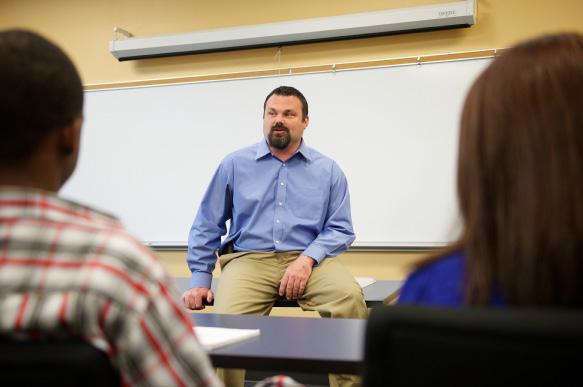


1. Worked with new industry partner and newly relocated company, Alevo, to test and train employees at the former Philip Morris location.
2. Sponsored a local healthcare summit which included representatives from CMCMain, YMCA-Rowan, Murdock Institute, Gentiva Home Health and Hospice, and others to provide feedback on current and projected health curriculum for the next five years.
C. Create and communicate the College’s brand and value through development and execution of a comprehensive marketing plan.
1. Developed robust marketing campaign including mobile radio, TV and social media.
2. Created, developed, and unveiled a new mascot designed to build morale and traditions to keep students, alumni, faculty and staff engaged.
3. Developed materials for the first Case for Support.
D. Collaborate with regional economic development partners to promote regional job growth and entrepreneurial opportunities.
1. Coordinated and managed 11 customized training projects and served five others through customized training business & industry services, expending more than $127,000 to train 856 employees for business expansion/retention.
2. Helped create 24 jobs, retain 15 jobs and assist with eight business start-ups through advising and coaching provided through Rowan-Cabarrus Small Business Center.
Salaries and Benefits
Supplies and Materials
Scholarships and Fellowships Utilities
Total Operating Expenses $54,541,062
Funds appropriated by the State of North Carolina support most College operations. State tuition from all of the 58 community colleges is pooled at the state level and used to fund a portion of each college’s state budget allocations. Curriculum tuition rates are set by the North Carolina General Assembly. The current rate for in-state tuition is $72 per credit hour and out-of-state tuition is $264 per credit hour, representing an increase of $0.50 per credit hour from the previous fiscal year. While community college tuition rates in North Carolina remain low when compared to other states, rates have increased by 43 percent since 2009-2010.
State budget appropriations are based on the previous year’s full-time equivalent (FTE) enrollments. In Fiscal 2013-2014 Rowan-Cabarrus was funded for a total of 6,379 budget FTE for the students enrolled in curriculum, continuing education and basic skills during the 2012-2013 academic year. The College’s Financial Statements for the year ending June 30, 2014, report operating and non-operating revenues totaling $57,825,166. This includes state current aid of $27,944,784 and $902,072 for state capital aid. County current appropriations for the year totaled $3,505,433 while county capital aid was $2,881,692. The remaining revenue was from grants, donations, sales and services receipts and student financial aid monies that are pass-through dollars


to the student. Additionally, the total revenue figure includes $4,072,084 in student tuition and fees, but it is important to note that state tuition monies are remitted to the state and not kept by the College. The College continued capital projects at multiple campuses in both counties during the year utilizing state bond dollars, Rowan County bond dollars and special capital appropriated funds from both counties to fund critically important renovation and construction projects. North Carolina community colleges operate on a cash basis accounting system with fiscal year end at June 30. Revenues may exceed expenditures when monies received for grants, financial aid awards and other institutionally funded activities are received before June 30, but expenditures are recorded after the end of the fiscal year.
In Fiscal 2013-2014, the College helped 5,716 students received financial aid totaling more than $34 million. The aid included $1.5 million in scholarships, grants and other forms of agency, state, and federal aid, as well as $16.5 million in Pell grants and $16.1 million in student loans. An economic impact study completed in 2014 by Economic Modeling Specialists International, indicates that the annual impact of Rowan-Cabarrus alumni in 20122013 was more than $234 million in added income within Rowan and Cabarrus counties.
The statement of net position reflects the overall financial position of the College at a given point in time. In Fiscal 2013-2014, the College’s total assets grew by 2.74 percent while total liabilities declined by 4.13 percent, and the College’s total net position
increased by 5.79 percent. The increase in net position is primarily due to an overall increase in construction in progress and capital assets resulting from continuing capital improvements in both counties.
Invested in Capital Assets
Restricted: Nonexpendable
Restriced: Expendable Unrestricted
Total Net Position: $60,007,168
Carl M. Short, Jr. | Chair
Cynthia L. Mynatt | Vice Chair
Carol S. Spalding, Ed.D. | President and Secretary to the Board
Matthew C. Barr
J. Thomas Bost
Paul A. Brown
Darise D. Caldwell, Ph.D.
R. Daryl Cox
Patricia G. Fulcher
Patricia K. Horton
Lynn G. Marsh, Ph.D.
Robert S. Misenheimer
Stephen M. Morris
Dakeita Vanderburg-Johnson
Quentin Woodward, Jr.
Anthony Rossi | Student Government Association President
Diane Honeycutt | Chair
Paul Brown | Vice Chair
Janet Spriggs | Treasurer
Carol Spalding, Ed.D. | Secretary
Cordelia Andrews
Raegan Brogdon
William R. Burgin
William C. Cannon, Jr.
Marcus Childs
Harold Earnhardt
Patricia K. Horton
Starling Johnson
Katrina King
Cynthia Mynatt
Irvin Newberry
Edward Norvell
Mary Ponds
Kelly Propst, Ed.D.
Lisa Tucker
Dakeita Vanderburg-Johnson
William Wagoner
Kathy Waters
Dennis E. Yates
Jonathan S. Chamberlain, B.B.C
Chief Officer of Facilities Services
Tina M. Haynes, M.S.
Chief Officer of Human Resources and Organizational Effectiveness

Carla G. Howell, A.A.S. Chief Officer of Governance, Foundation & Public Relations
Ken G. Ingle, B.S. Chief Information Officer
Gaye N. McConnell, M.A.
Vice President of Enrollment and Student Experience
Craig R. Lamb, M.A. Vice President of Corporate and Continuing Education
Janet N. Spriggs, M.S. Chief Financial Officer
Johnnie Simpson, M.A.
Interim Vice President of Academic Programs
Rowan-Cabarrus Community College improves lives and builds community through public higher education and workforce development.
Rowan-Cabarrus Community College is an open-door, comprehensive learning-centered institution of higher education serving the citizens of Rowan and Cabarrus counties. The college, a member of the North Carolina Community College System, offers affordable occupational and education programs leading to Associate in Arts Degree, Associate in Science Degree, Associate in Fine Arts Degree, Associate in General Education Degree, and Associate in Applied Science Degrees. Diplomas and certificates are awarded for other occupational, adult and continuing education programs. The primary focus of the college’s offerings is on workforce development by meeting the educational needs of the individual and meeting the changing training requirements of business and industrial firms as well as other employers in the service area. Reflecting its commitment to student learning outcomes, the college strives to inspire its students to increase their knowledge, develop occupational and technical proficiencies, respond to lifelong learning opportunities, and increase their awareness as responsible citizens in a democratic society.
Building sustainable futures through the power of learning.
• Excellence and innovation in education and workforce training;
• Continuous improvement through lifelong learning and achievement;
• Trust, integrity, inclusiveness, and mutual respect;
• Exemplary service through team work;
• Responsibility, sustainability, accountability;
• Leadership, partnership and global citizenship.

